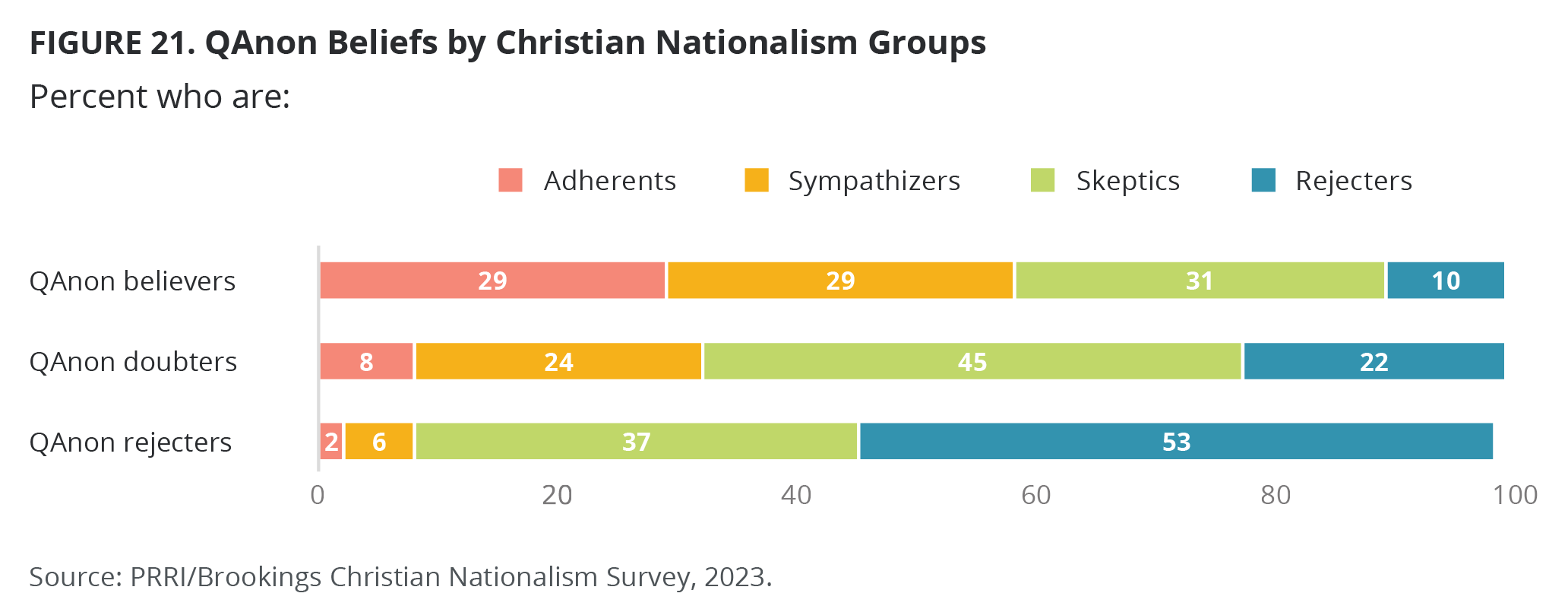*To see the latest data on this topic, see PRRI’s February 2024 report: “Support for Christian Nationalism in All 50 States: Findings from PRRI’s 2023 American Values Atlas.”
Introduction
The rising influence of Christian nationalism in some segments of American politics poses a major threat to the health of our democracy. Increasingly, the major battle lines of the culture war are being drawn between a right animated by a Christian nationalist worldview and Americans who embrace the country’s growing racial and religious diversity. This new PRRI/Brookings survey of more than 6,000 Americans takes a closer look at the underpinnings of Christian nationalism, providing new measures to estimate the proportion of Americans who adhere to and reject Christian nationalist ideology. The survey also examines how Christian nationalist views intersect with white identity, anti-Black sentiment, support of patriarchy, antisemitism, anti-Muslim sentiments, anti-immigrant attitudes, authoritarianism, and support for violence. Additionally, the survey explores the influence Christian nationalism has within our two primary political parties and major religious subgroups and what this reveals about the state of American democracy and the health of our society.
Measuring Christian Nationalism
To measure Christian nationalism, the PRRI/Brookings Christian Nationalism Survey included a battery of five questions about the relationship between Christianity, American identity, and the U.S. government. Respondents were asked whether they completely agree, mostly agree, mostly disagree, or completely disagree with each of the following statements:
- The U.S. government should declare America a Christian nation.
- U.S. laws should be based on Christian values.
- If the U.S. moves away from our Christian foundations, we will not have a country anymore.
- Being Christian is an important part of being truly American.
- God has called Christians to exercise dominion over all areas of American society.
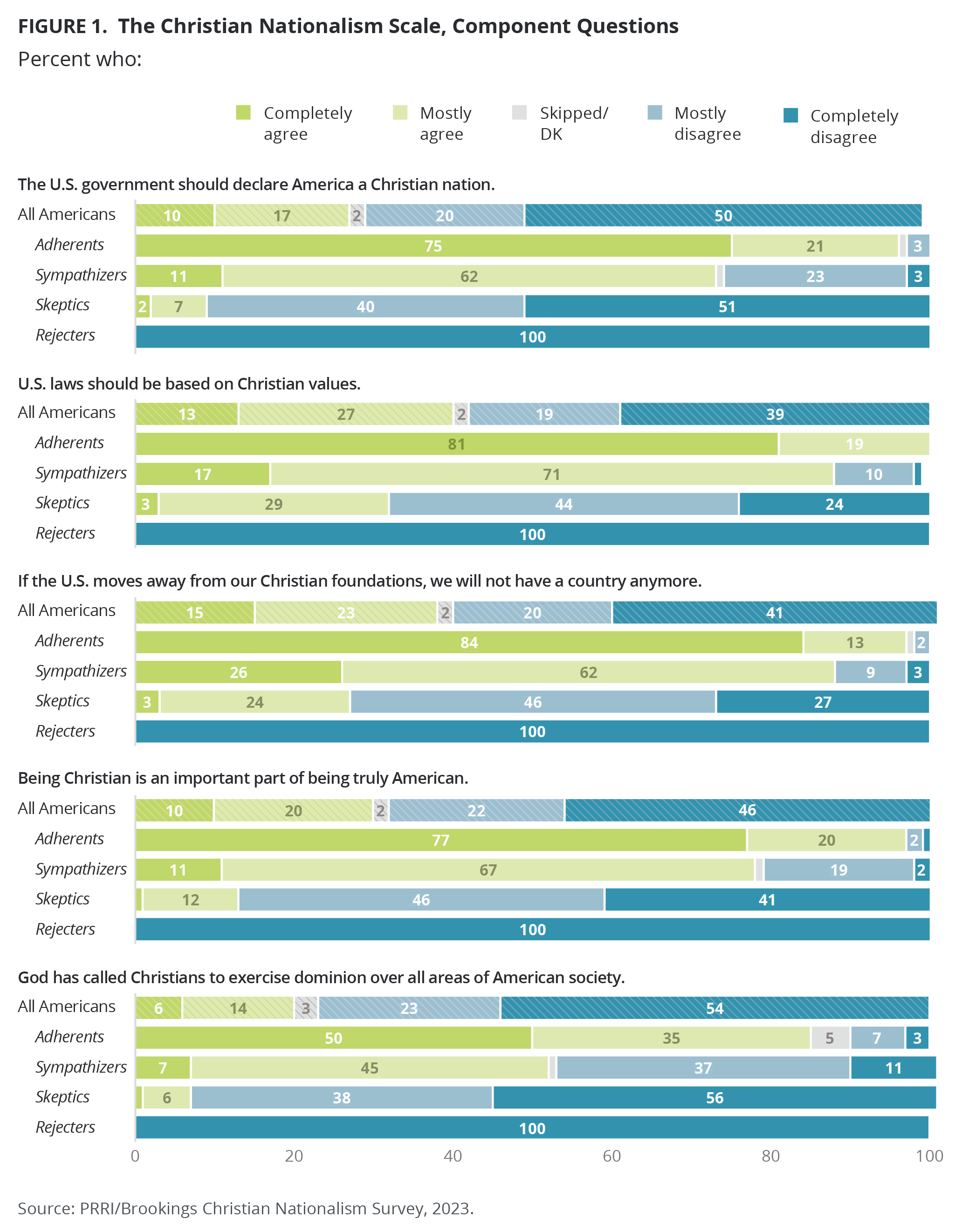
The answers across all five questions are highly correlated, with a Cronbach’s alpha of 0.92, and they were combined to create a Christian nationalism scale. The Christian nationalism scale combines answers to these questions using an additive scale and recalibrates the scores to values from 0 (low) to 1 (high). Appendix A contains a more in-depth explanation of scale construction.
Each respondent is given a composite score based on their answers to the five questions and is then assigned into one of four key groups:
Christian Nationalism Adherents (Score 0.75–1): These Americans overwhelmingly either agree or completely agree with the statement in the scale. This group includes 10% of Americans.
Christian Nationalism Sympathizers (Score 0.5–0.74): A majority of these Americans agree with the statements in the scale but they are less likely than adherents to completely agree. This group includes 19% of Americans.
Christian Nationalism Skeptics (Score 0.01-0.49): A majority of these Americans disagree with the statements in the scale but are less likely than rejecters to completely disagree. This group includes 39% of Americans.
Christian Nationalism Rejecters (Score 0): These Americans completely disagree with all 5 statements in the scale. This group includes 29% of Americans.
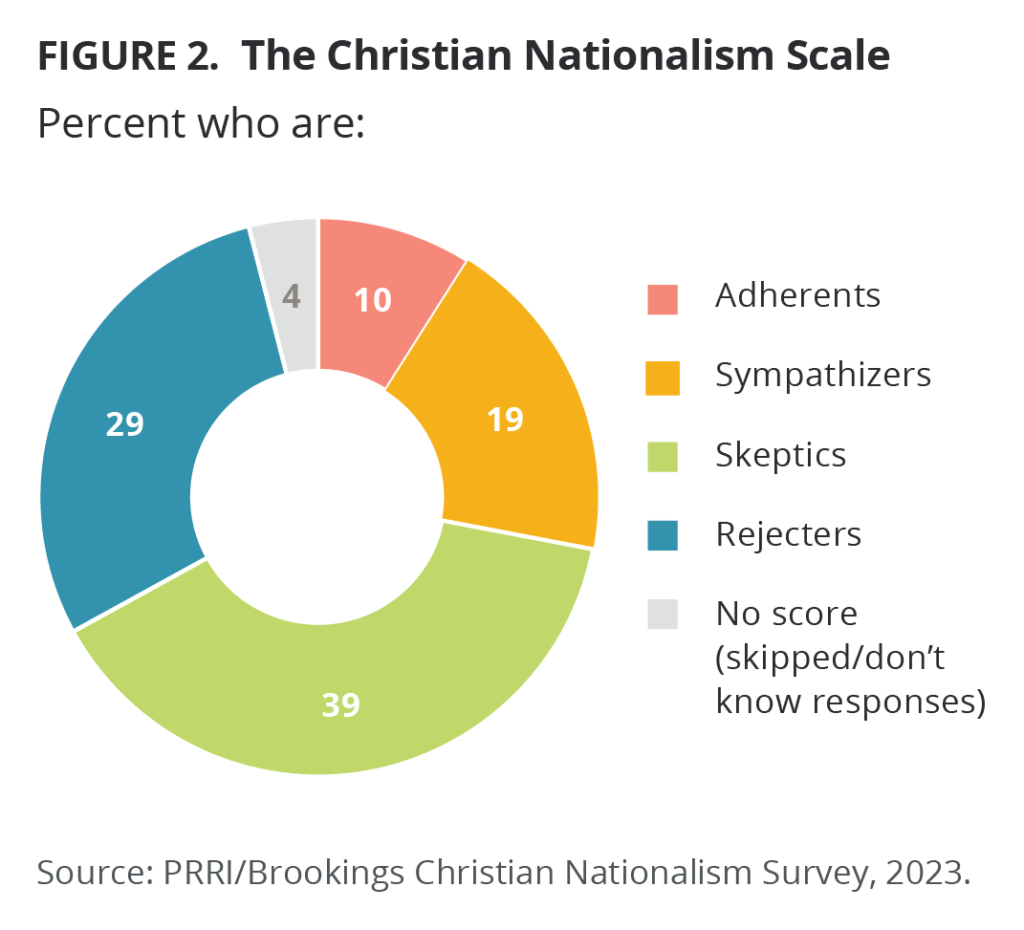
Which Americans are Most Supportive of Christian Nationalism?
Religious Identity
White evangelical Protestants are more supportive of Christian nationalism than any other group surveyed. Nearly two-thirds of white evangelical Protestants qualify as either Christian nationalism sympathizers (35%) or adherents (29%). A majority of “other Protestants of color,” a group consisting primarily of Asian American and Pacific Islander (AAPI) and mixed-race Protestants, also qualify as either sympathizers (32%) or adherents (20%). Approximately four in ten Hispanic Protestants (23% sympathizers and 20% adherents), Black Protestants (24% sympathizers and 14% adherents), and Latter-day Saints (33% sympathizers and 5% adherents) also lean toward supporting Christian nationalism.
At the other end of the spectrum, more than three-quarters of Hispanic Catholics, other non-Christian religious Americans,[1] Jews, and religiously unaffiliated Americans qualify as either Christian nationalism skeptics or rejecters. Notably, majorities of other non-Christian religious Americans (54%), Jewish Americans (61%), and religiously unaffiliated Americans (61%) qualify as rejecters.
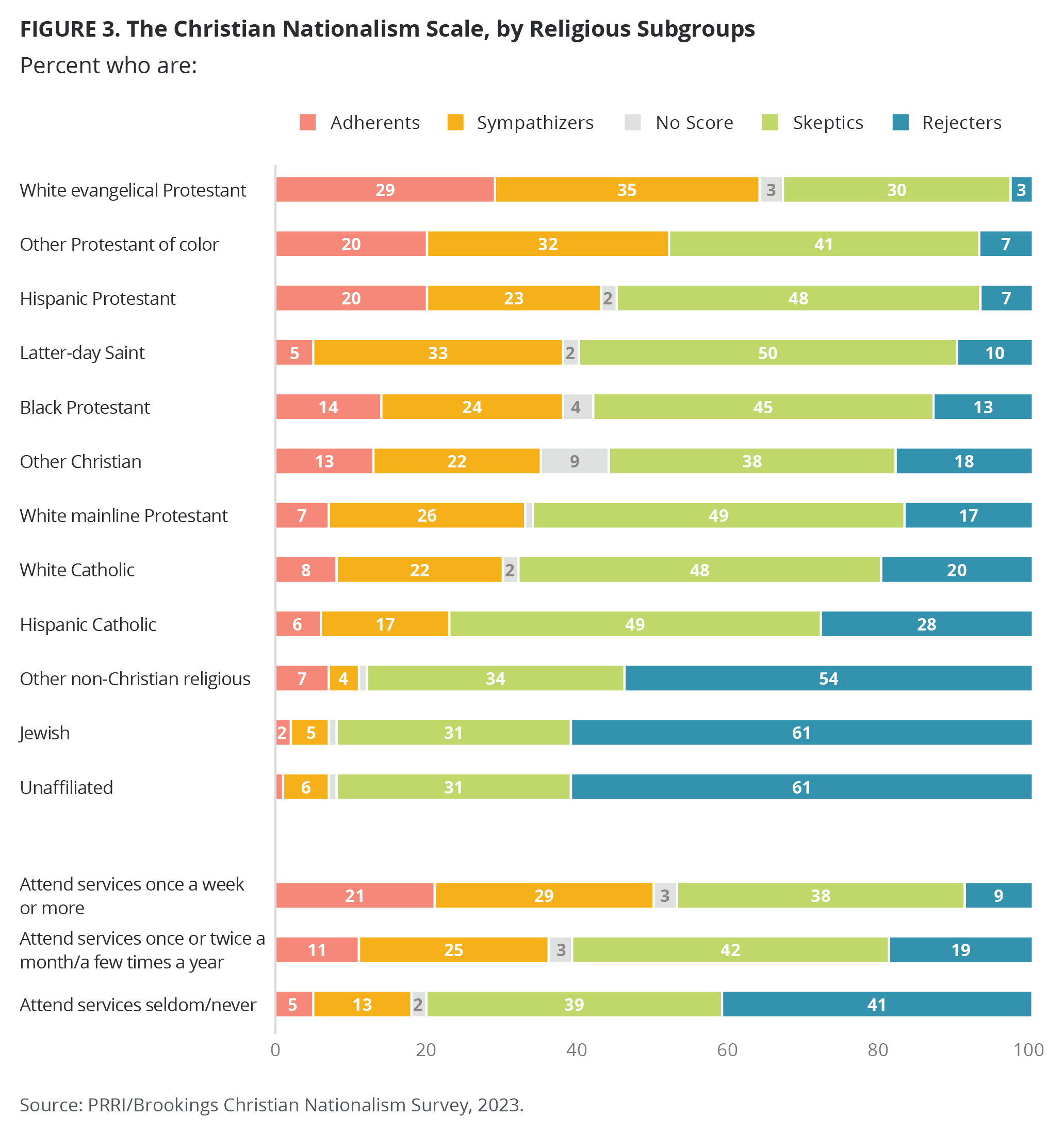
Identifying as evangelical or born-again is positively correlated with holding Christian nationalist views across racial and ethnic lines. White (29%), Hispanic (25%), and Black (20%) Christians who identify as born-again or evangelical are each about five times as likely to be Christian nationalism adherents as members of the same racial or ethnic groups who identify as Christian but not evangelical (6% of white non-evangelicals, 4% of Black non-evangelicals, and 4% of Hispanic non-evangelicals).
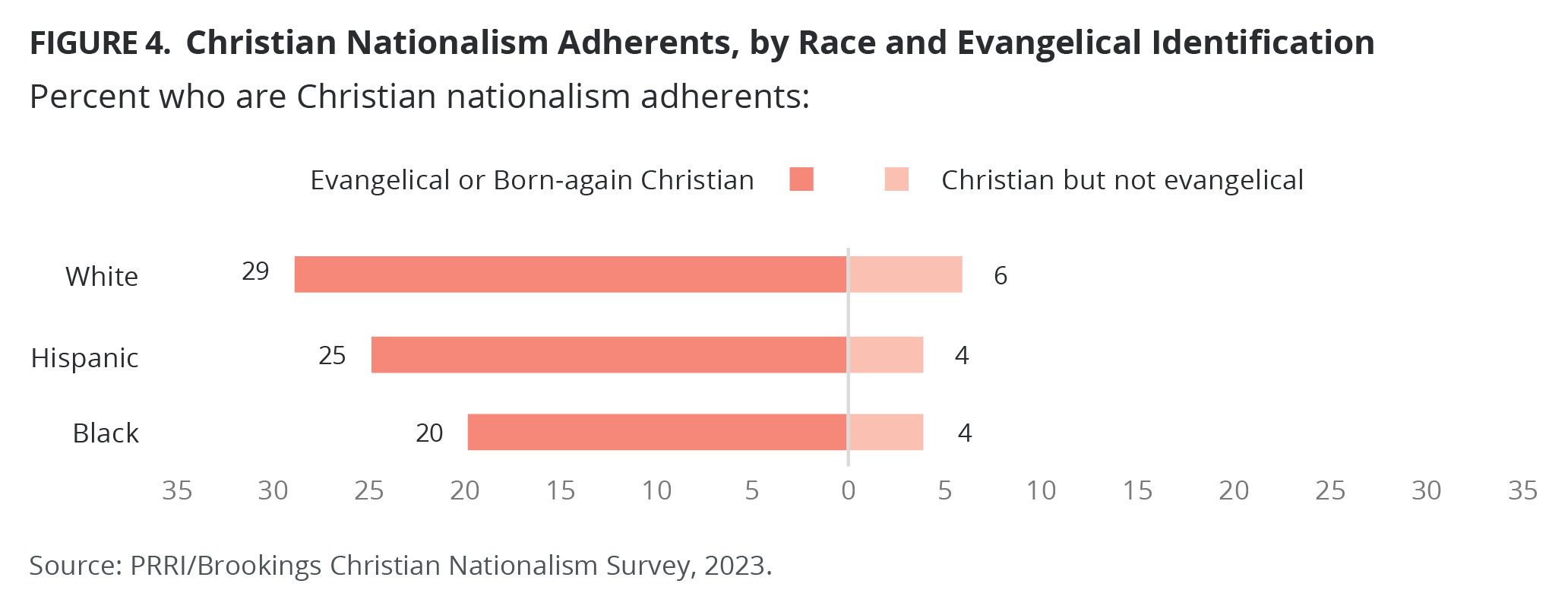
Religious Practice and Salience
Americans who lean toward supporting Christian nationalism are not, as some have theorized, Christian in name only. They are significantly more likely than other Americans to be connected to churches and to say religion is important in their lives.
Christian nationalism adherents are nearly twice as likely as Americans overall to report attending religious services at least a few times a month (54% vs. 28%). As support for Christian nationalism goes down, so do reported church attendance rates: 42% of Christian nationalism sympathizers report attending church at least a few times a month, compared with 27% of skeptics, and only 10% of rejecters.
Similarly, 44% of Christian nationalism adherents report that religion is the most important thing in their lives, compared to 24% of sympathizers, 10% of skeptics, and 3% of rejecters.
Partisanship
Partisanship is closely linked to Christian nationalist views. Most Republicans qualify as either Christian nationalism sympathizers (33%) or adherents (21%), while at least three-quarters of both independents (46% skeptics and 29% rejecters) and Democrats (36% skeptics and 47% rejecters) lean toward rejecting Christian nationalism. Republicans (21%) are about four times as likely as Democrats (5%) or independents (6%) to be adherents of Christian nationalism.
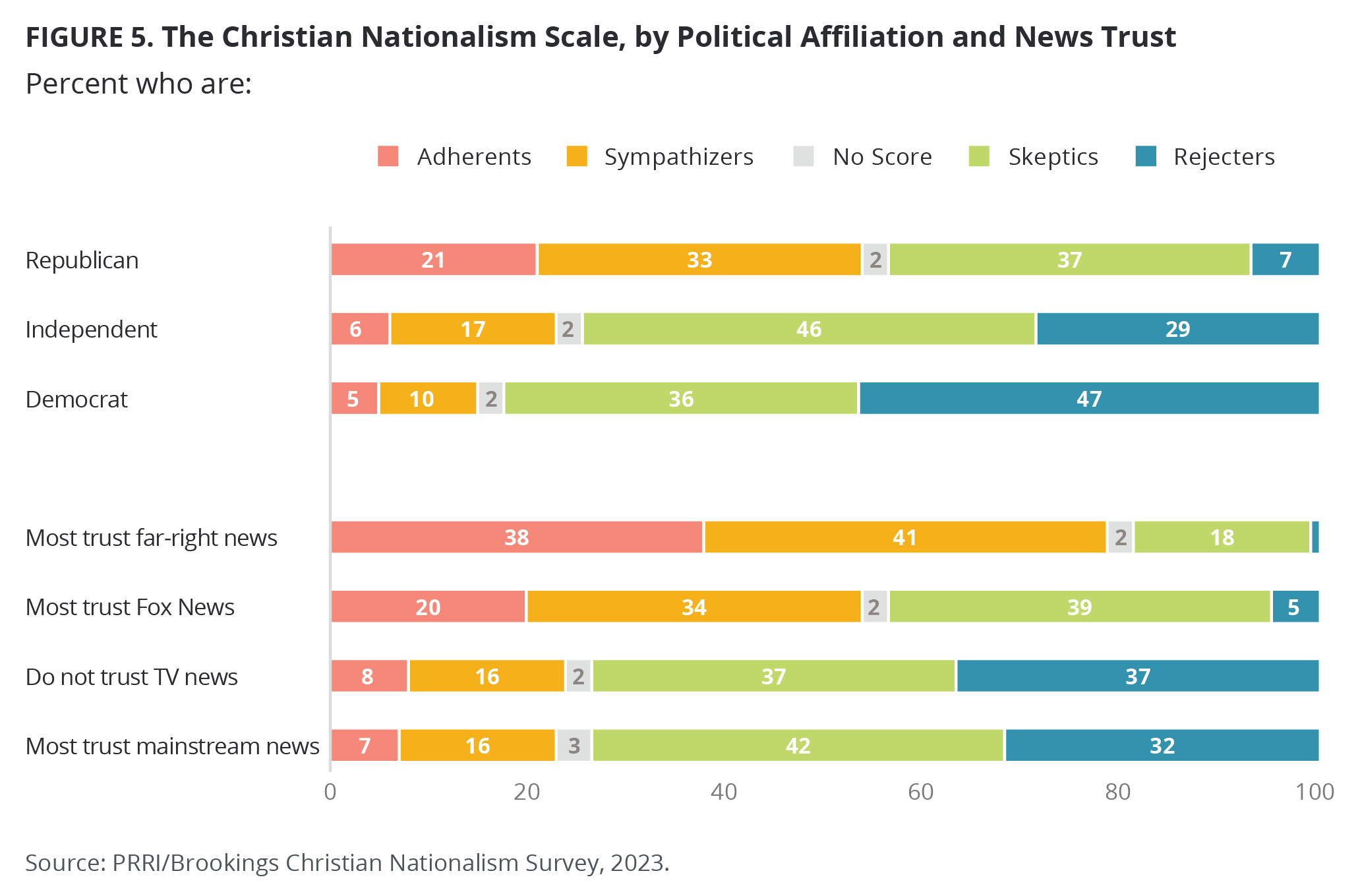
Similarly, attitudes toward former President Donald Trump and President Joe Biden are highly correlated with attitudes toward Christian nationalism. Just one-third of Americans (32%) hold a favorable view of former President Trump, while two-thirds (65%) have unfavorable views of him. More than 7 in 10 Christian nationalism adherents (71%) have a favorable view of Trump, including 43% who hold very favorable views of him. A majority of Christian nationalism sympathizers also hold favorable views of Trump (57%), compared to 29% of skeptics, and 8% of rejecters.
By contrast, Americans overall are more evenly divided in their views of President Joe Biden (47% favorable, 49% unfavorable). Just 17% of Christian nationalism adherents and 24% of Christian nationalism sympathizers hold favorable views of Biden, compared to 50% of skeptics and 70% of rejecters.
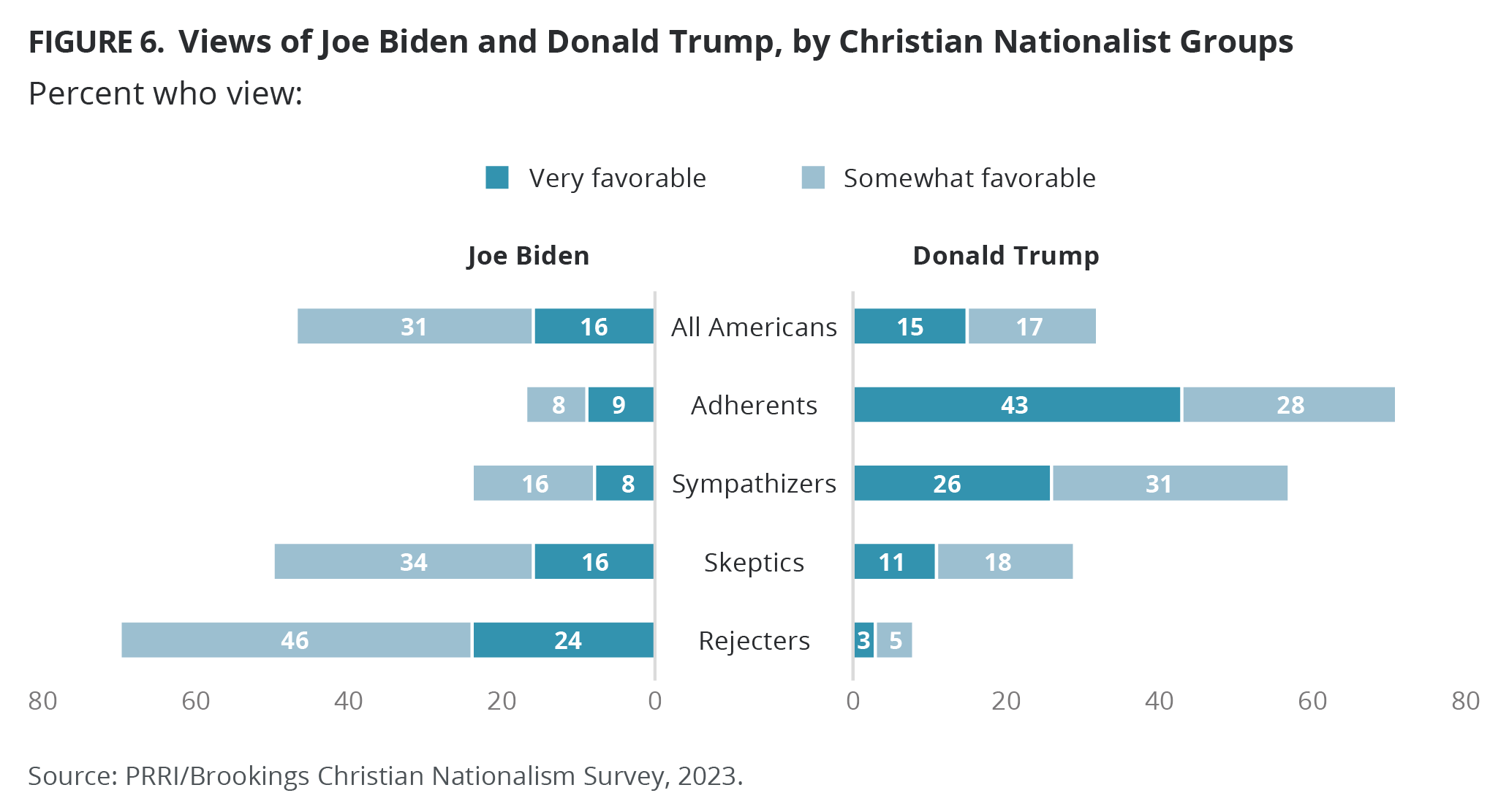
Trust in Television Media Sources
Differences in trust of various media sources strongly correlate with differences in Christian nationalist beliefs. Nearly eight in ten Americans who most trust far-right news outlets such as One America News Network and Newsmax lean toward supporting Christian nationalism (41% sympathizers and 38% adherents). And the same is true of a majority of those who most trust Fox News (34% sympathizers and 20% adherents). Meanwhile, only about a quarter of those who most trust mainstream news or who do not trust any TV news sources support Christian nationalism.[2]
Gender
There are no significant differences in Christian nationalist beliefs by gender. Among both men and women, 10% qualify as Christian nationalism adherents, and approximately two in ten qualify as Christian nationalism sympathizers (18% of men and 20% of women). And approximately seven in ten men and women qualify as either Christian nationalism skeptics or rejecters.
Age
Support for Christian nationalist beliefs increases with age, with a significant break around age 50. One-third or more of Americans ages 50-64 (22% sympathizers, 11% adherents) and ages 65 and older (23% sympathizers, 13% adherents) lean toward supporting Christian nationalism. By contrast, more than seven in ten Americans ages 18-29 (37% skeptics, 42% rejecters) and ages 30-49 (37% skeptics, 35% rejecters) lean toward opposing Christian nationalism.
Educational Attainment and Race
Differences in educational attainment also correlate closely with Christian nationalist beliefs. Americans with a high school degree or less (13%) and those with some college experience but no four-year degree (11%) are roughly twice as likely as those with a four-year college degree (6%) or a postgraduate degree (4%) to be Christian nationalism adherents. By contrast, approximately four in ten Americans with a four-year college degree (40%) or postgraduate degree (41%) qualify as Christian nationalism rejecters, compared to only 28% of those with some college and 21% of those with a high school education or less.
There are minimal differences in adherence to Christian nationalism beliefs by race. Rates of support for Christian nationalism are roughly the same among white Americans (20% sympathizers, 10% adherents) and Black Americans (21% sympathizers, 10% adherents). The only racial group whose members are significantly less likely than others to qualify as Christian nationalism adherents is AAPI Americans (4%).
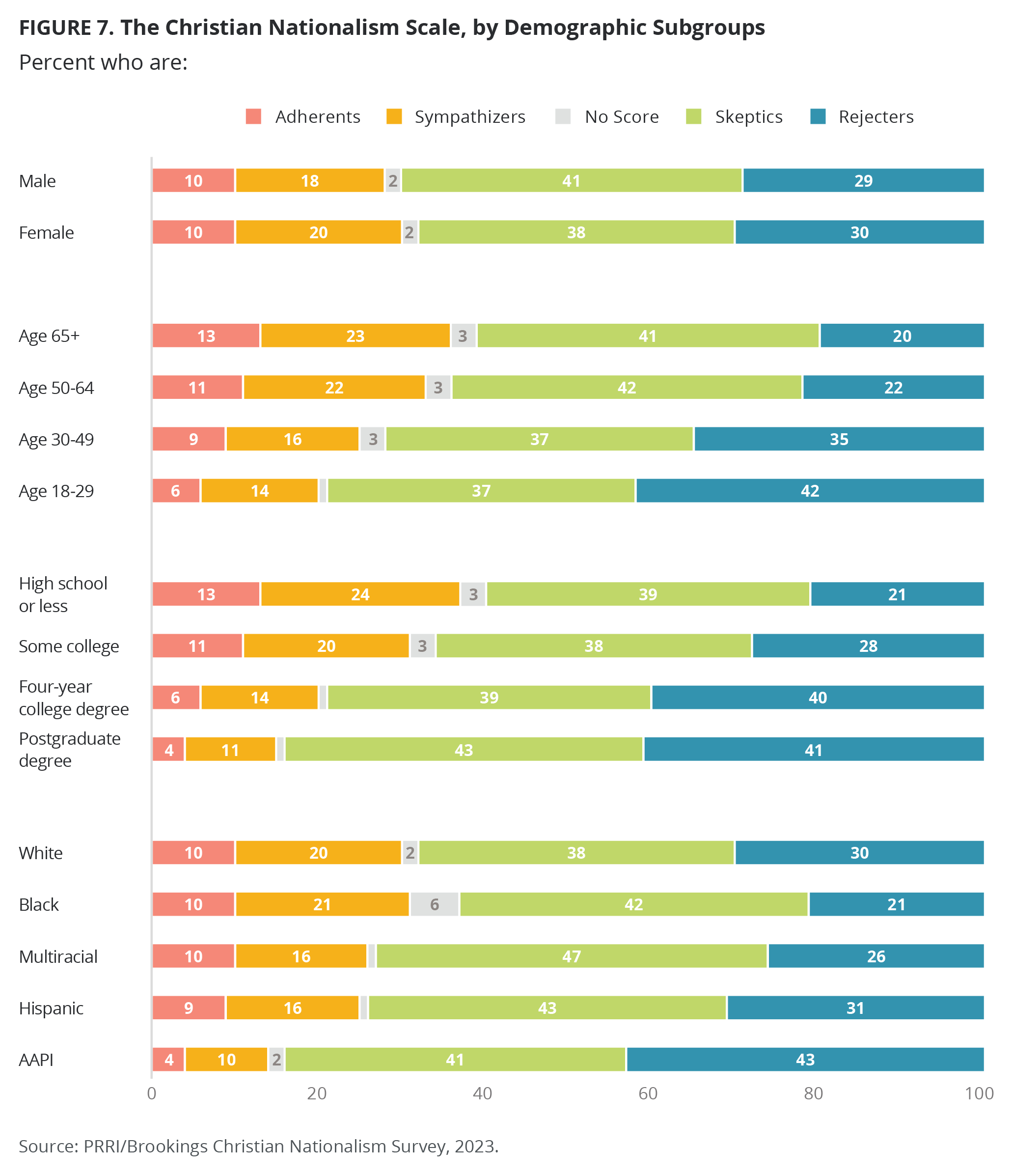
Education levels influence the likelihood that white and Hispanic Americans will qualify as Christian nationalism adherents. White (5%) and Hispanic Americans (4%) with four-year college degrees are less likely than their non-college graduate counterparts (13% and 10%, respectively) to qualify as Christian nationalism adherents. There is no significant gap between the proportion of Black college graduates (9%) and non-college graduates (11%) who are Christian nationalism adherents.
However, among Christian nationalism rejecters, there are more pronounced racial and ethnic differences, including significant divides by education within racial or ethnic groups. A plurality of AAPI (43%) reject Christian nationalism views, compared to fewer Hispanic (31%), white (30%), multiracial (26%), and Black Americans (21%). There are double-digit education gaps on this issue among AAPI (48% of those with a four-year degree are rejecters vs. 33% of those with no degree), Hispanic Americans (44% vs. 28%) white Americans (40% vs. 24%), and Black Americans (29% vs. 19%).
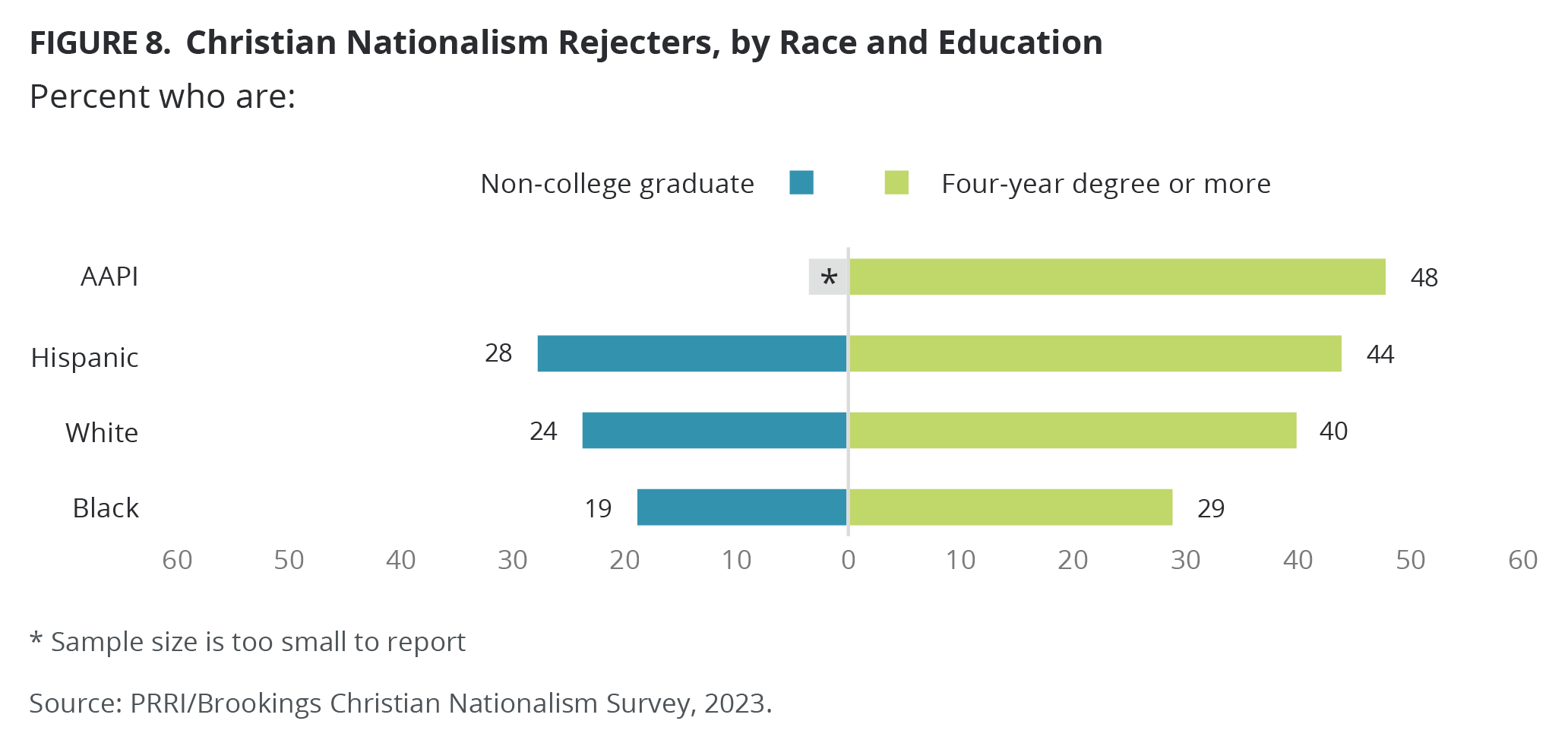
Perceptions of the term “Christian Nationalism”
More than one-third of Americans (35%) say they have not heard the term “Christian nationalism,” but the term has a decidedly negative connotation among those who have been exposed to it. Americans are more than twice as likely to hold an unfavorable view of the term than to hold a favorable view of it (44% vs. 20%).
Attitudes about the term “Christian nationalism” correlate positively with scores on the Christian nationalism scale. A majority of Christian nationalism adherents hold favorable views of the concept (54%, including 36% who are very favorable toward Christian nationalism), while just 8% hold unfavorable views and 38% are not familiar with the concept. The rates are similar among white Christian nationalism adherents (55% favorable) and adherents of color (52% favorable).[3]
By contrast, nearly 8 in 10 Christian nationalism rejecters (79%) hold an unfavorable view of the term “Christian nationalism,” including 71% who hold a very unfavorable view. Notably, Christian nationalism rejecters are half as likely as any other Christian nationalism subgroup to say they are unfamiliar with the term (18% of rejecters have not heard of the term).
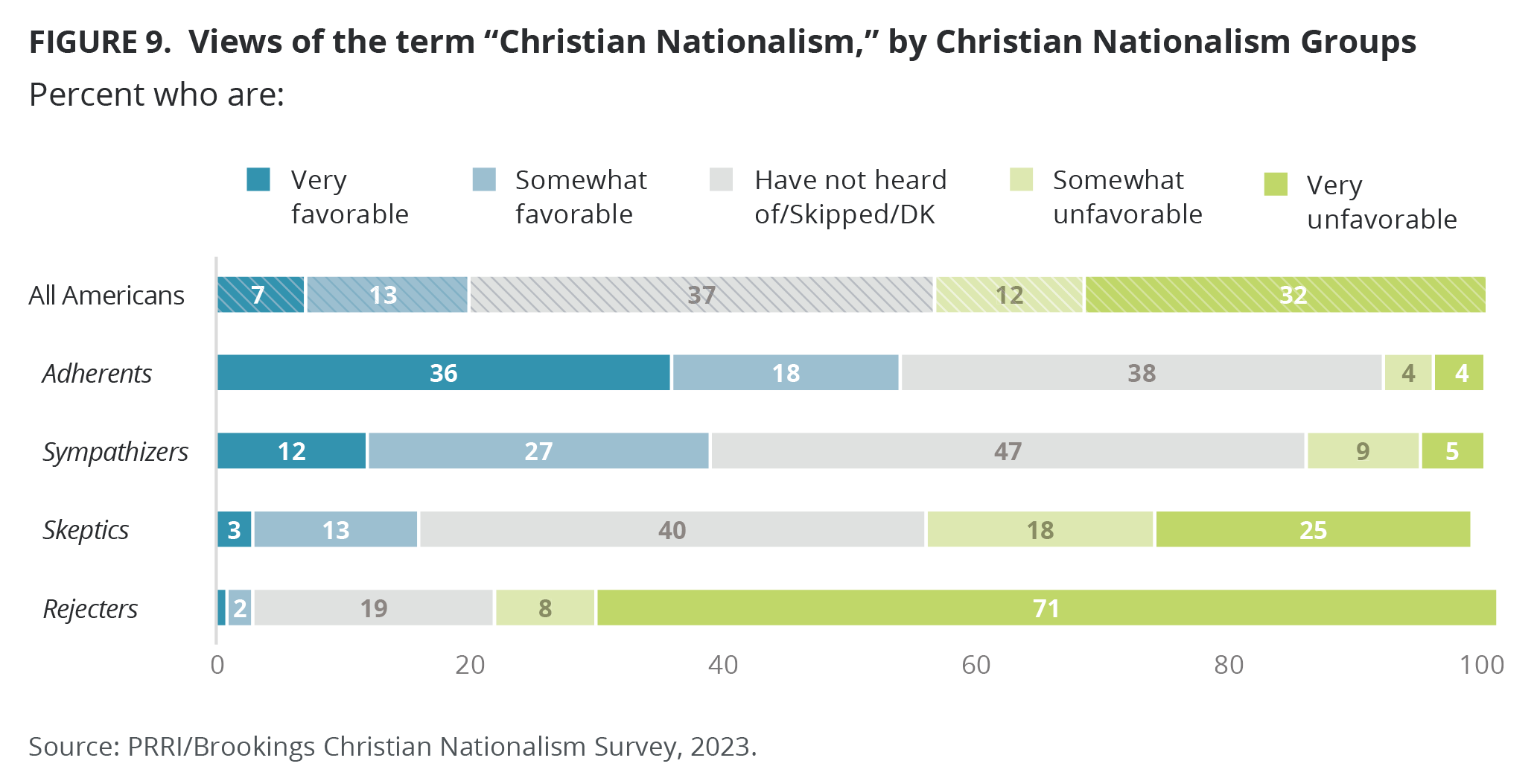
The Influence of Christian Nationalism on Attitudes about Pluralism and Social Justice
Religious Pluralism vs. Christian Homogeneity
The survey asked Americans about religious pluralism by asking them to choose between two contrasting statements:
- Statement 1: I would prefer the U.S. to be a nation made up of people belonging to a wide variety of religions.
- Statement 2: I would prefer the U.S. to be a nation primarily made up of people who follow the Christian faith.
Americans overall are much more likely to express a preference for the U.S. to be a nation made up of people belonging to a variety of religions (73%), rather than a nation primarily made up of people who follow the Christian faith (27%). But these views are highly stratified by attitudes toward Christian nationalism.
Christian nationalism adherents overwhelmingly express a preference for a primarily Christian nation (77%, including 59% who believe this strongly). A majority of Christian nationalism sympathizers (55%) also say they would prefer a primarily Christian nation, though they are less likely than adherents to strongly favor the idea (29%).
Overwhelming majorities of Christian nationalism skeptics (81%) and rejecters (98%, including 82% who feel strongly) express a preference for a country made up of a variety of religions.
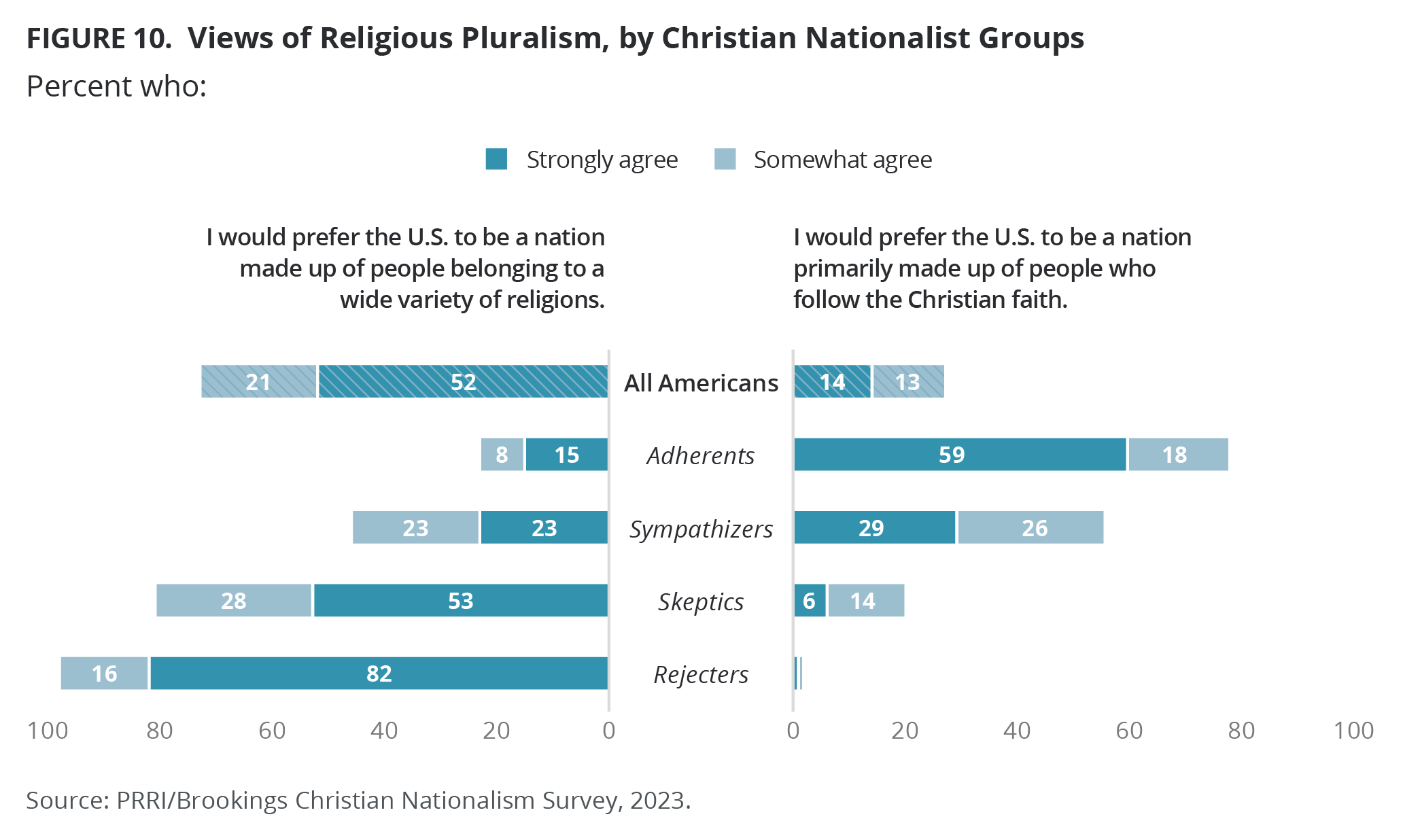
Religious Isolationism
Reflecting their preference for a primarily Christian nation, supporters of Christian nationalism are far less likely than other Americans to have regular interactions with people who hold religious beliefs that differ from their own. Nearly half of Americans (46%) report that they have conversations with people who belong to a different religion from their own at least a few times per month. Christian nationalism adherents, however, are half as likely as rejecters to report regular interreligious interactions (33% vs. 62%).
Religious Obligations: Individual Acts of Charity vs. Creating a Just Society
Americans are divided over their understanding of biblical injunctions to care for the poor. The survey asked Americans to choose between two contrasting statements:
- Statement 1: In the Bible, when Jesus and prophets talked about taking care of the poor, they were primarily talking about charitable acts by individuals.
- Statement 2: In the Bible, when Jesus and the prophets talked about taking care of the poor, they were primarily talking about our obligation to create a just society.
A majority of Americans (54%) believe that biblical injunctions to care for the poor are primarily talking about charitable acts by individuals, compared to 47% who believe they are primarily talking about our obligation to create a just society.
About two-thirds of Christian nationalism adherents (65%) and sympathizers (65%) agree that biblical obligations are more about charitable acts by individuals, compared to 57% of skeptics and 39% of rejecters who agree. Christian nationalism rejecters are the only group in which a majority (61%) believe the biblical injunctions refer primarily to the task of creating a just society.
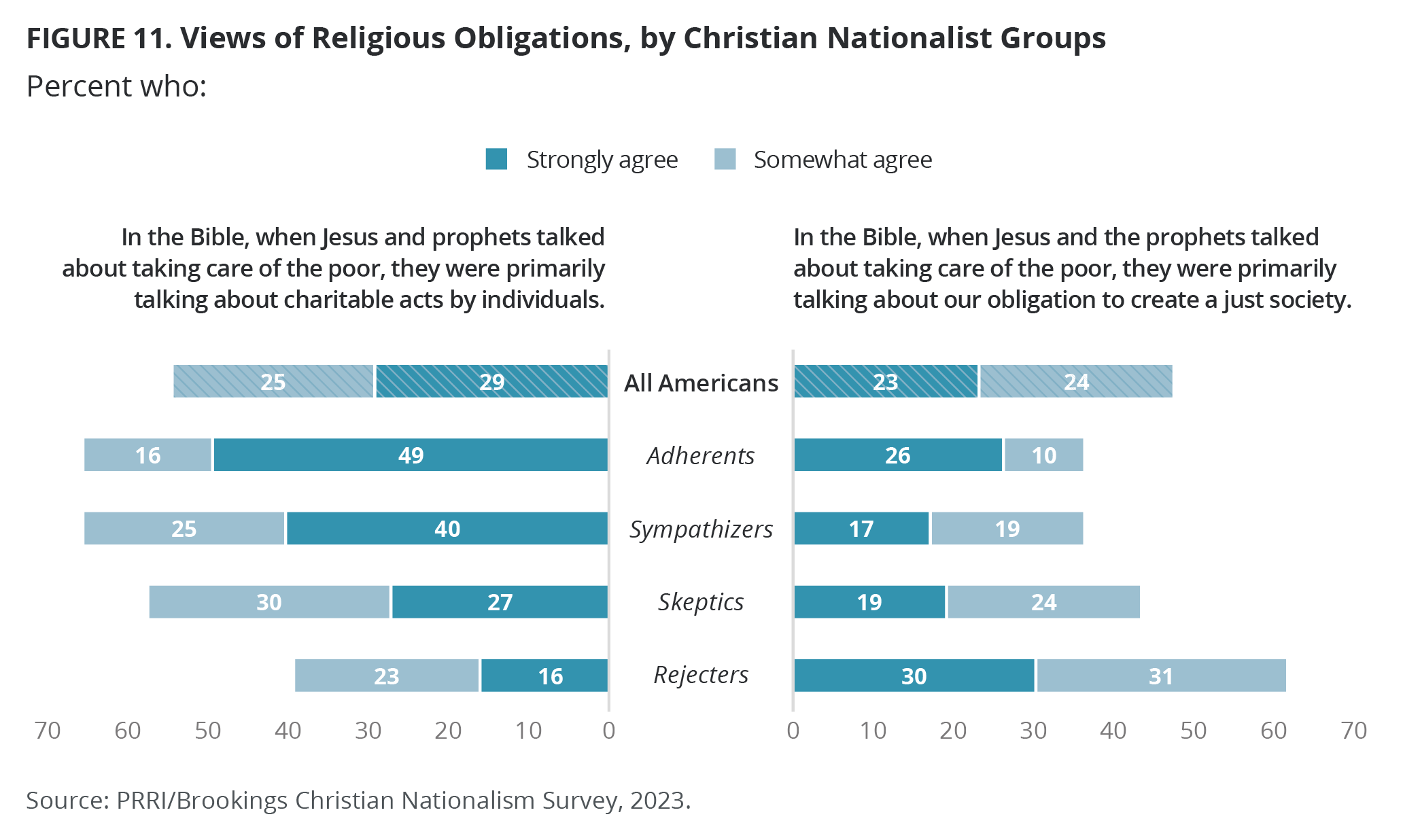
Five Correlates of Christian Nationalism
To better understand the inner workings of Christian nationalism, we examine five core attitudes often associated with Christian nationalist beliefs: anti-Black racism, anti-immigrant views, antisemitic views, anti-Muslim views, and patriarchal understandings of traditional gender roles.
Anti-Black Racism
Only about one-third of Americans (32%) disagree that white supremacy is still a major problem in the U.S. today, compared to 65% who agree. However, majorities of Christian nationalism sympathizers (53%) and adherents (57%) disagree that white supremacy remains a problem. Among Christian nationalism sympathizers and adherents who are white, disagreement rises to nearly two thirds (64% and 66%, respectively).
A majority of Americans (53%) believe that “generations of slavery and discrimination have created conditions that make it difficult for many Black Americans to work their way out of the lower class,” compared to 45% who disagree. However, 66% of Christian nationalism sympathizers and 70% of adherents reject this idea. Disagreement rises to more than three-quarters among white Christian nationalism sympathizers and adherents (77% and 83%, respectively).
Around four in ten Americans (41%) agree that discrimination against white Americans is as big of a problem as discrimination against Black Americans and other minorities, compared to 58% who disagree. Approximately two-thirds of Christian nationalism sympathizers (66%) and more than three-quarters of Christian nationalism adherents (77%) agree with this statement. Among Christian nationalism sympathizers and adherents who are white, agreement with this sentiment rises to 73% and 85%, respectively.
Six in ten Americans (62%) agree with the statement “A Black person is more likely than a white person to receive the death penalty for the same crime,” compared to 36% who disagree. By contrast, majorities of Christian nationalism sympathizers (57%) and adherents (62%) disagree. More than two-thirds of white Christian nationalism sympathizers and adherents disagree (67% and 72%, respectively).
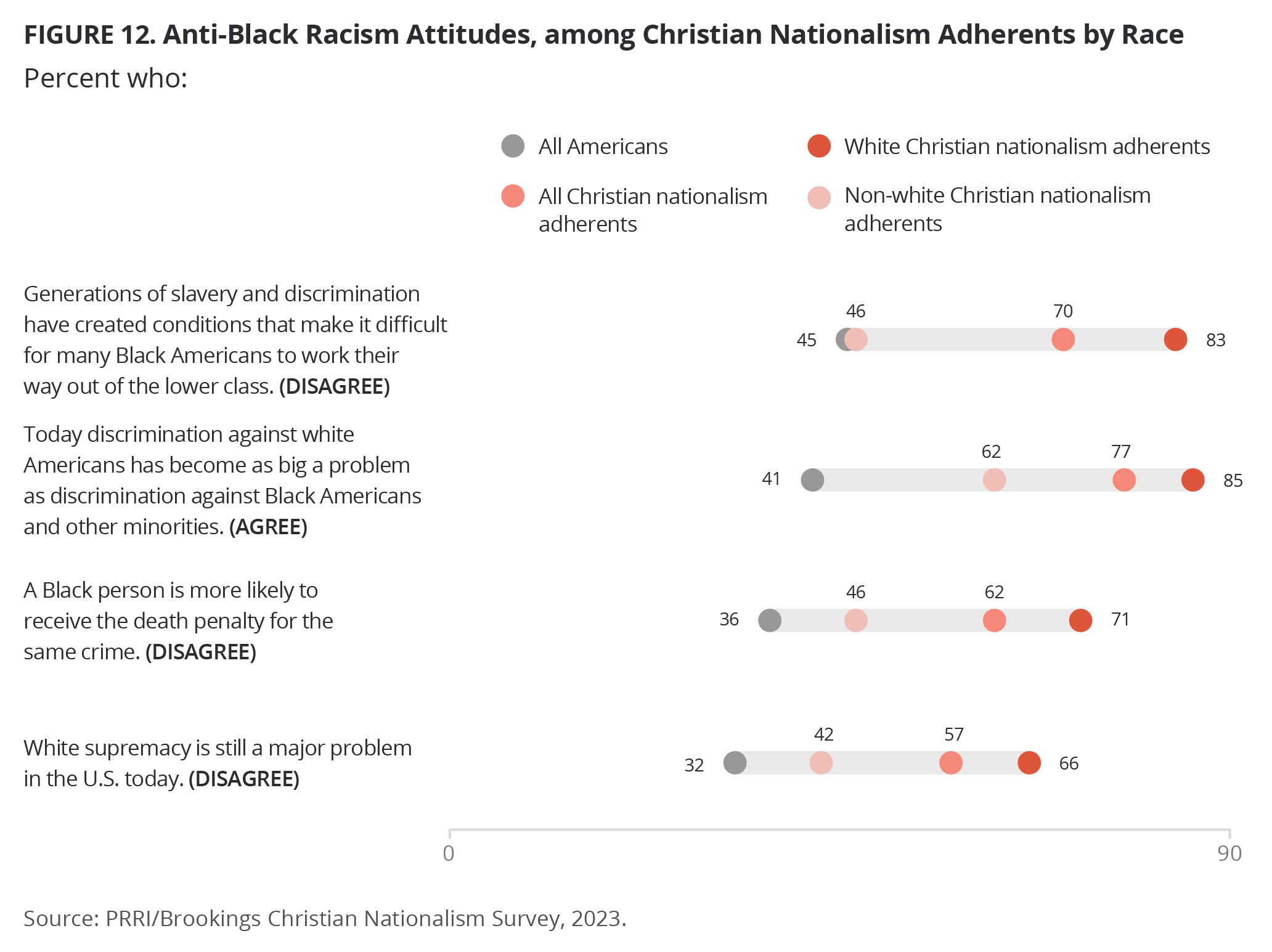
Anti-Immigrant Views
Americans who are supportive of Christian nationalism generally hold less favorable views of immigrants. Among Americans overall, only 32% affirm the core tenet of so-called “replacement theory,” the belief that immigrants are “invading our country and replacing our cultural and ethnic background,” while 67%disagree. However, 57% of Christian nationalism sympathizers and 71% of adherents agree with this assertion of replacement theory. Among Christian nationalism sympathizers and adherents who are white, belief in replacement theory rises to 66% and 81%, respectively.
By a margin of nearly two to one, Americans believe that the growing number of newcomers from other countries strengthens American society (63% agree, 34% disagree). However, solid majorities of Christian nationalism sympathizers (58%) and adherents (64%) disagree that immigrants strengthen the country. Among Christian nationalism sympathizers and adherents who are white, disagreement rises to 64% and 72%, respectively.
Americans are divided in their agreement with the statement “The American way of life needs to be protected from foreign influence” (50% agree, 48% disagree). However, the vast majority of Christian nationalism sympathizers (73%) and adherents (82%) agree, including a majority of adherents (54%) who completely agree. Among Christian nationalism sympathizers and adherents who are white, agreement rises to 77% and 85%, respectively.
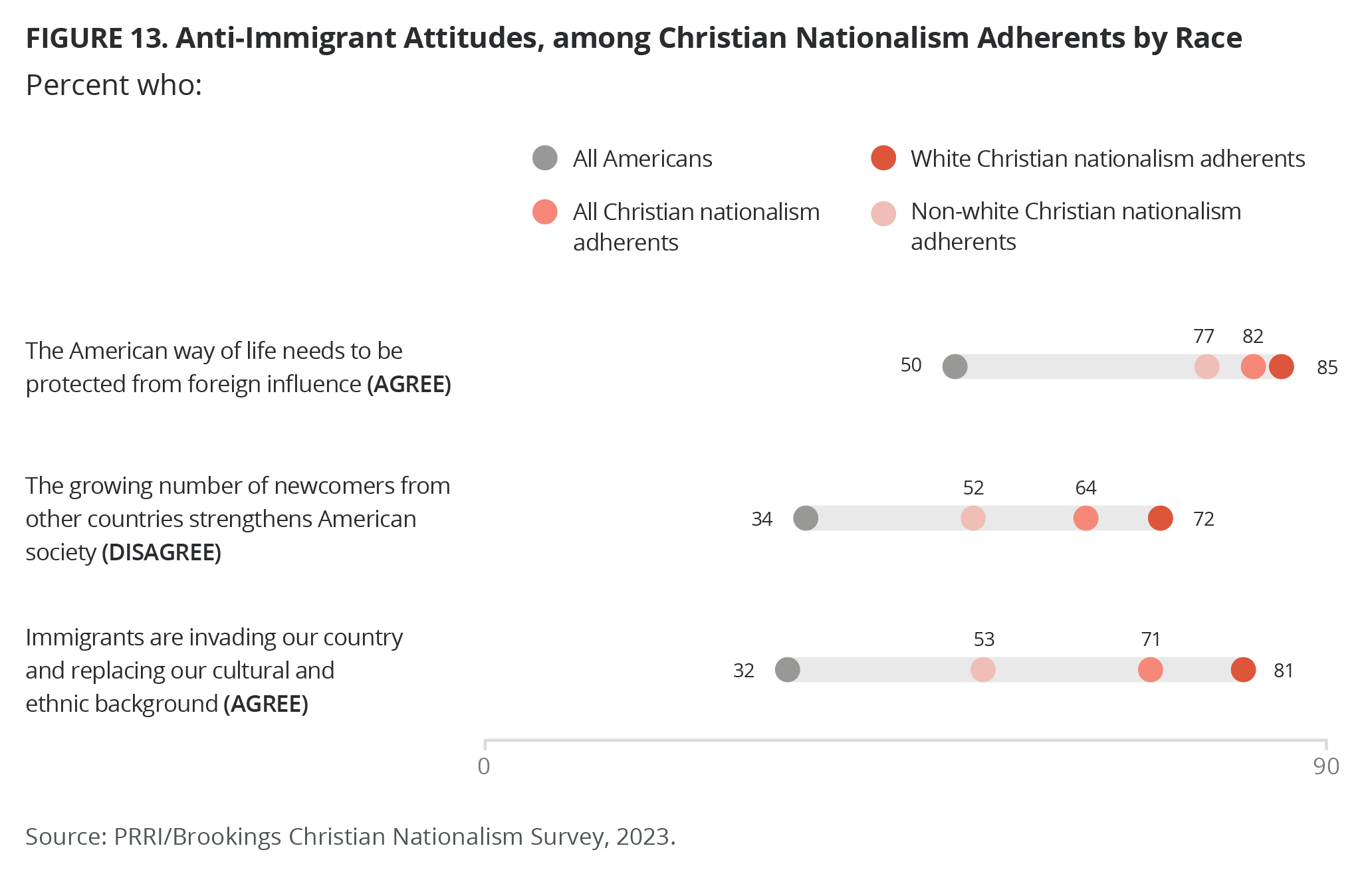
Antisemitic Views
Fourteen percent of Americans say that the statement “Jewish people hold too many positions of power” somewhat or completely describes the United States today, while 82% say it describes the U.S. a little or not at all, including 67% who say it does not describe the country at all. The share who believe this antisemitic stereotype rises to 19% among Christian nationalism sympathizers and 23% among Christian nationalism adherents.
Notably, there are only modest differences among white and non-white Christian nationalism supporters on all questions related to anti-Semitism.
About two in ten Americans (21%) believe that Christians in America love Israel more than most Jewish people in America do, while 73% reject this idea. The share who agree with this statement rises to 29% among Christian nationalism sympathizers. Christian nationalism adherents are approximately twice as likely as all Americans to hold this belief, with 40% expressing agreement.
Roughly a quarter of Americans (24%) say that Jewish people are more loyal to Israel than to the United States, while 70% say this statement is only a little or not at all true. The rate of agreement is significantly higher among Christian nationalism sympathizers (37%) and adherents (44%).
Around four in ten Americans (41%) believe that Jewish people “stick together more than other Americans,” while a majority (53%) do not believe this is true. Affirmation of this statement rises to a majority among Christian nationalism sympathizers (52%) and to six in ten among Christian nationalism adherents (61%).
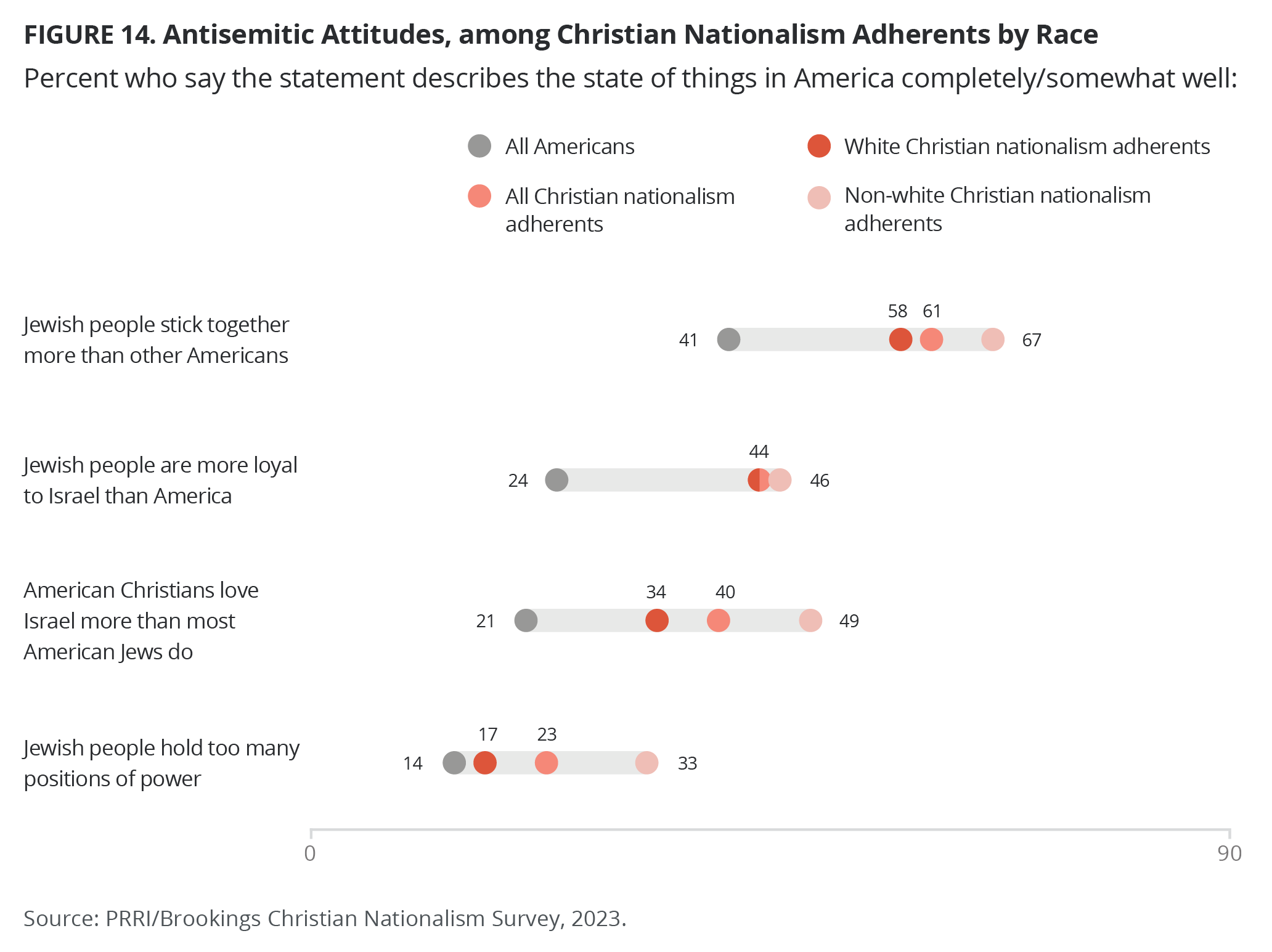
Anti-Muslim Views
About three in ten Americans (29%) agree that we should prevent people from some majority Muslim countries from entering the United States, while two-thirds disagree (68%). Around half of Christian nationalism sympathizers (49%) and two-thirds of adherents (67%) agree. Among Christian nationalism sympathizers and adherents who are white, agreement rises to 52% and 72%, respectively.
Fewer than four in ten Americans (39%) believe that the values of Islam are at odds with American values and the American way of life, while a majority of Americans disagree (57%). A solid majority of Christian nationalism sympathizers (58%) and nearly seven in ten adherents (69%) agree with this anti-Muslim view. There are only modest differences among white and non-white Christian nationalism sympathizers and adherents.
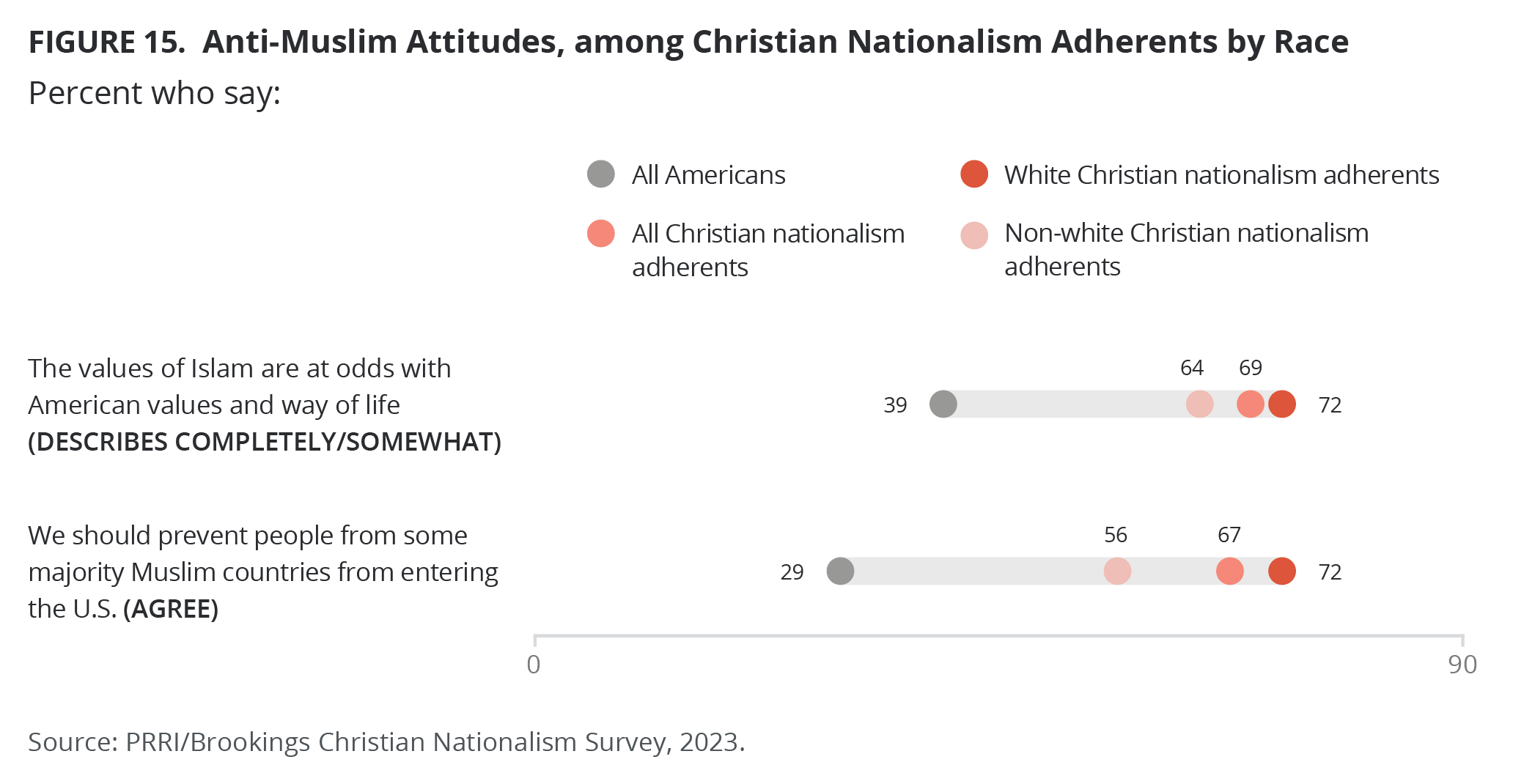
Gender and the Patriarchy
One-third of Americans (33%) agree that “in a truly Christian family, the husband is the head of the household, and his wife submits to his leadership,” while 64% disagree. Roughly half of Christian nationalism sympathizers (51%) and nearly seven in ten adherents (69%) agree with this statement. Among Christian nationalism sympathizers and adherents who are white, affirmation of hierarchical gender roles is slightly lower, at 45% and 65%, respectively.
More than eight in ten Americans (83%) agree that “American society improves when women have more career and educational opportunities,” while just 15% disagree. Christian nationalism sympathizers (23%) and adherents (31%) are much more likely to disagree with this statement. On this question, there are only modest differences among white and non-white Christian nationalism sympathizers and adherents.
About one-third of Americans (34%) agree that “society seems to punish men just for acting like men,” and 63% of Americans disagree. However, the rate of agreement increases to a majority among Christian nationalism sympathizers (54%) and adherents (62%). There are only modest differences among white and non-white Christian nationalism sympathizers and adherents.
Around four out of ten Americans (38%) believe that “society as a whole has become too soft and feminine,” while 59% disagree. At least six in ten Christian nationalism sympathizers (60%) and adherents (66%) agree with this statement. Here too, there are only modest differences among white and non-white sympathizers and adherents.
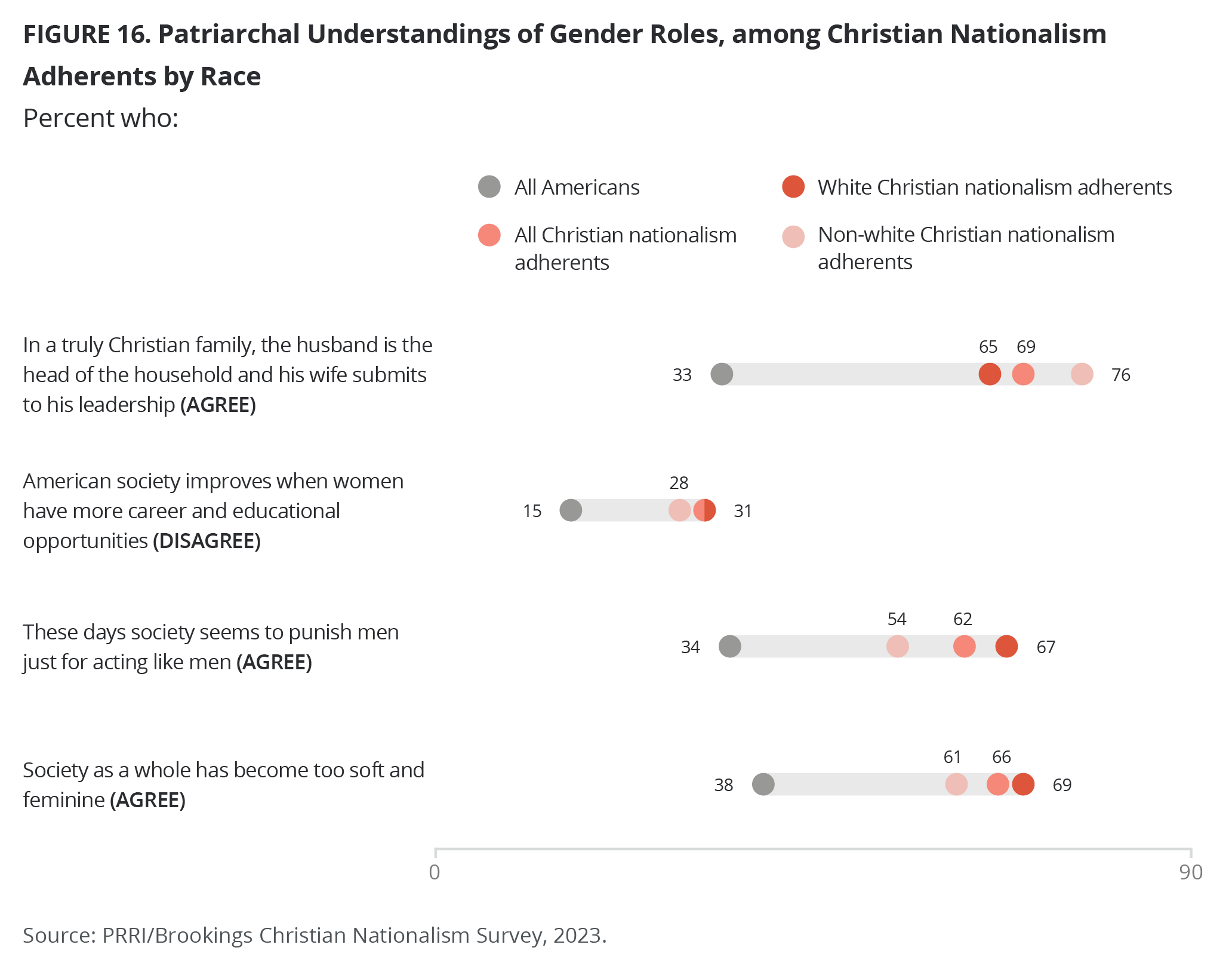
Christian Nationalism, Authoritarianism, and the Police
Authoritarianism
Supporters of Christian nationalism tend to support obedience to authority and the idea of authoritarian leaders who are willing to break the rules. While half of Americans (50%) agree that society is in trouble because people do not obey authority, this number rises to 69% among Christian nationalism sympathizers and 74% among Christian nationalism adherents.
Only about three in ten Americans (28%) agree that “because things have gotten so far off track in this country, we need a leader who is willing to break some rules if that’s what it takes to set things right.” However, nearly four in ten Christian nationalism sympathizers (38%) and half of Christian nationalism adherents (50%) support this notion of an authoritarian leader.
Views of the Police
A majority of Americans hold favorable views of the police, but Americans overall are notably more likely to hold a favorable view of the local police who protect people in their community (80%) than of the U.S. Capitol police who protect elected officials in Washington, D.C. (68%).
This discrepancy is driven by partisanship and support for Christian nationalism. Republicans are 25 percentage points more likely to report a favorable view of their local police than of the U.S. Capitol police (91% vs. 66%). By contrast, among Democrats the rates of favorability toward local police and the U.S. Capitol police are nearly identical (77% and 76%, respectively).
Similarly, among Christian nationalism adherents, there is a 21-percentage-point difference between favorable views of local police and of U.S. Capitol police (83% vs. 62%). At the other end of the Christian nationalism scale, the opposite is true. Christian nationalism rejecters hold slightly less favorable views of local police than of the U.S. Capitol police (68% vs. 74%).
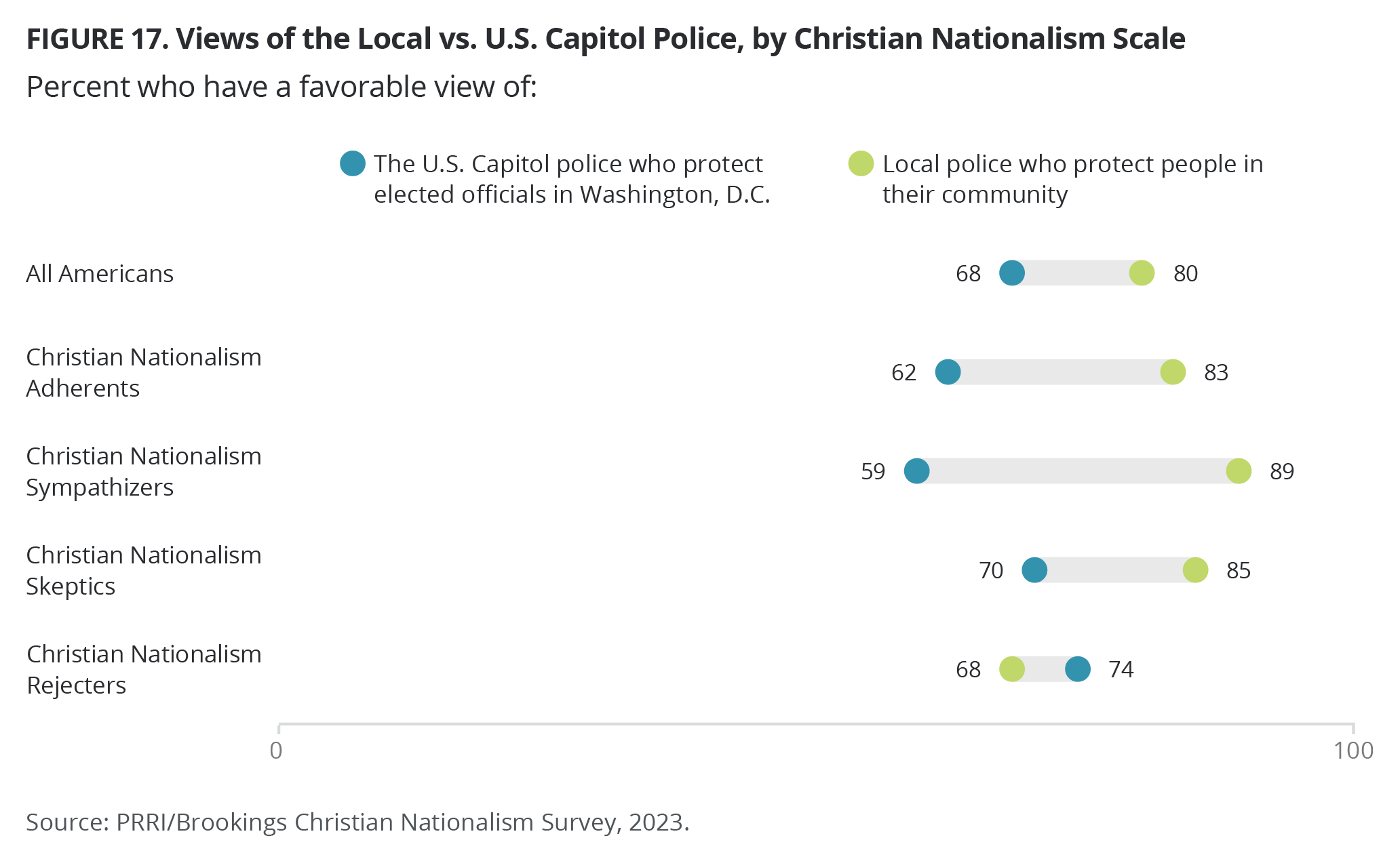
Christian Nationalism and Violence
Experiences with Violence
An element of the more extreme versions of Christian nationalism is a willingness to fight to make the United States. a Christian nation. Christian nationalist symbols were proudly on display at the violent riot at the U.S. Capitol on Jan. 6, 2021. To examine the relationship between attitudes about violence and views on Christian nationalism, we asked respondents about their experiences with handling disagreement, including whether they had ever resorted to violence. We also asked about their views on political violence.
Respondents were asked how they had handled disagreements in their personal lives over the past few years and were presented with five different scenarios, ranging from “discussed it calmly” to “threatened to use, or actually used, a gun, knife, or other weapon on someone.” Two-thirds of Americans (68%) say they calmly discussed and settled disagreements and say this approach was the right decision, while 4% say they used the same approach but believe it was the wrong decision. Christian nationalism adherents (62%) are less likely than all Americans (68%) and Christian nationalism rejecters (75%) to say they settled disagreements calmly.
A plurality of Americans (45%) say that they have handled a disagreement by physically leaving rather than staying to argue and that they believe it was the right decision, while 5% say they took this course of action but it was the wrong decision. Christian nationalism adherents (44%) are about as likely as all Americans (45%), but less likely than Christian nationalism rejecters (52%), to say they have left a room instead of arguing.
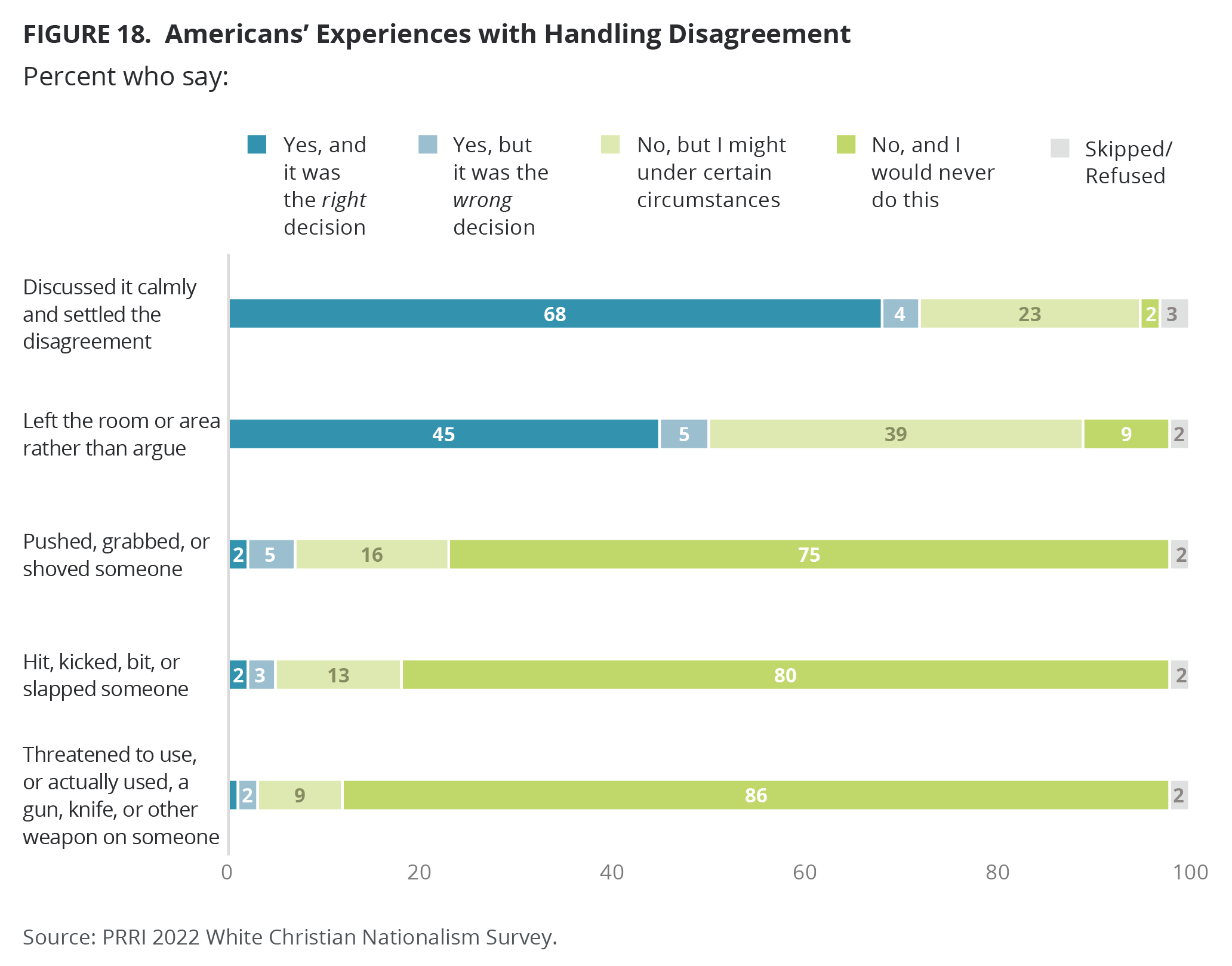
Only 2% of Americans say they have pushed, grabbed, or shoved someone because of a disagreement in the past few years and say it was the right decision, while 5% did this but say it was the wrong decision. Three-quarters of Americans (75%) said they would never do this. Similarly, only 2% say they have hit, kicked, bit, or slapped someone and it was the right decision, and 3% did this but say it was the wrong decision. Eight in ten Americans (80%) say they would never do this. Christian nationalism adherents are nearly twice as likely as rejecters to say they have pushed, grabbed, or shoved someone (9% vs. 5%) or to say they have hit, kicked, bit, or slapped someone (9% vs. 4%) to resolve a disagreement.
When Americans were asked if in the past few years they have threatened to use, or have actually used, a gun, knife, or other weapon on someone because of a disagreement, only 1% say they have and that it was the right decision. Meanwhile, 2% say they have and think it was the wrong decision. An additional 9% say they have not used or threatened to use a weapon on another person but might do so in the right circumstances. The overwhelming majority of Americans (86%) say they would never do this.
Among Christian nationalism adherents, 7% say they have used or threatened to use a weapon on someone else (3% say it was the right decision and 4% say it was the wrong decision), compared to only 2% of Christian nationalism rejecters. An additional 9% of Christian nationalism adherents say they might use a weapon in the right circumstances, compared to 6% of rejecters.
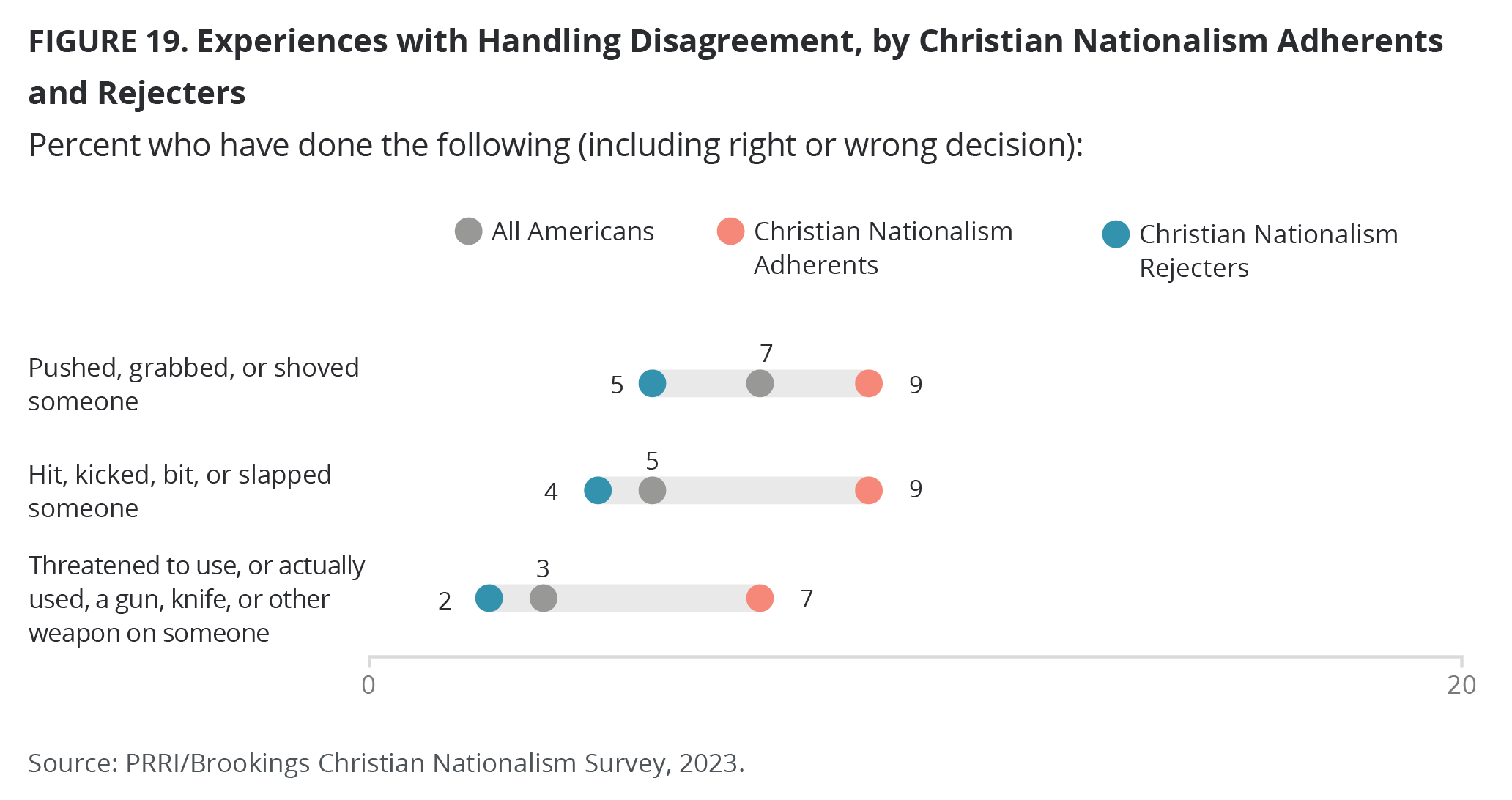 Combining these last three experience categories, 9% of Americans say they have engaged in some type of physical assault or use of a weapon (whether or not it was the right decision), and 22% say they can imagine doing so in the right circumstances. Among Christian nationalism adherents, 12% say they have engaged in some type of physical assault or use of a weapon to resolve disagreements, and 21% say they could imagine doing so in the right circumstances. By contrast, only 7% of Christian nationalism rejecters say they have resolved disagreements by engaging in physical assault or using a weapon, though a similar share (20%) say they can imagine doing so in the right circumstances.
Combining these last three experience categories, 9% of Americans say they have engaged in some type of physical assault or use of a weapon (whether or not it was the right decision), and 22% say they can imagine doing so in the right circumstances. Among Christian nationalism adherents, 12% say they have engaged in some type of physical assault or use of a weapon to resolve disagreements, and 21% say they could imagine doing so in the right circumstances. By contrast, only 7% of Christian nationalism rejecters say they have resolved disagreements by engaging in physical assault or using a weapon, though a similar share (20%) say they can imagine doing so in the right circumstances.
Support for Political Violence
Only 16% of Americans agree with the statement “Because things have gotten so far off track, true American patriots may have to resort to violence in order to save our country,” while the overwhelming majority of Americans (81%) disagree.
Christian nationalism adherents are nearly seven times as likely as Christian nationalism rejecters to support political violence. Four in ten Christian nationalism adherents (40%) agree with this statement about patriots resorting to violence, compared to only 22% of sympathizers, 15% of skeptics, and 6% of rejecters. There are no significant differences by race within the groups.
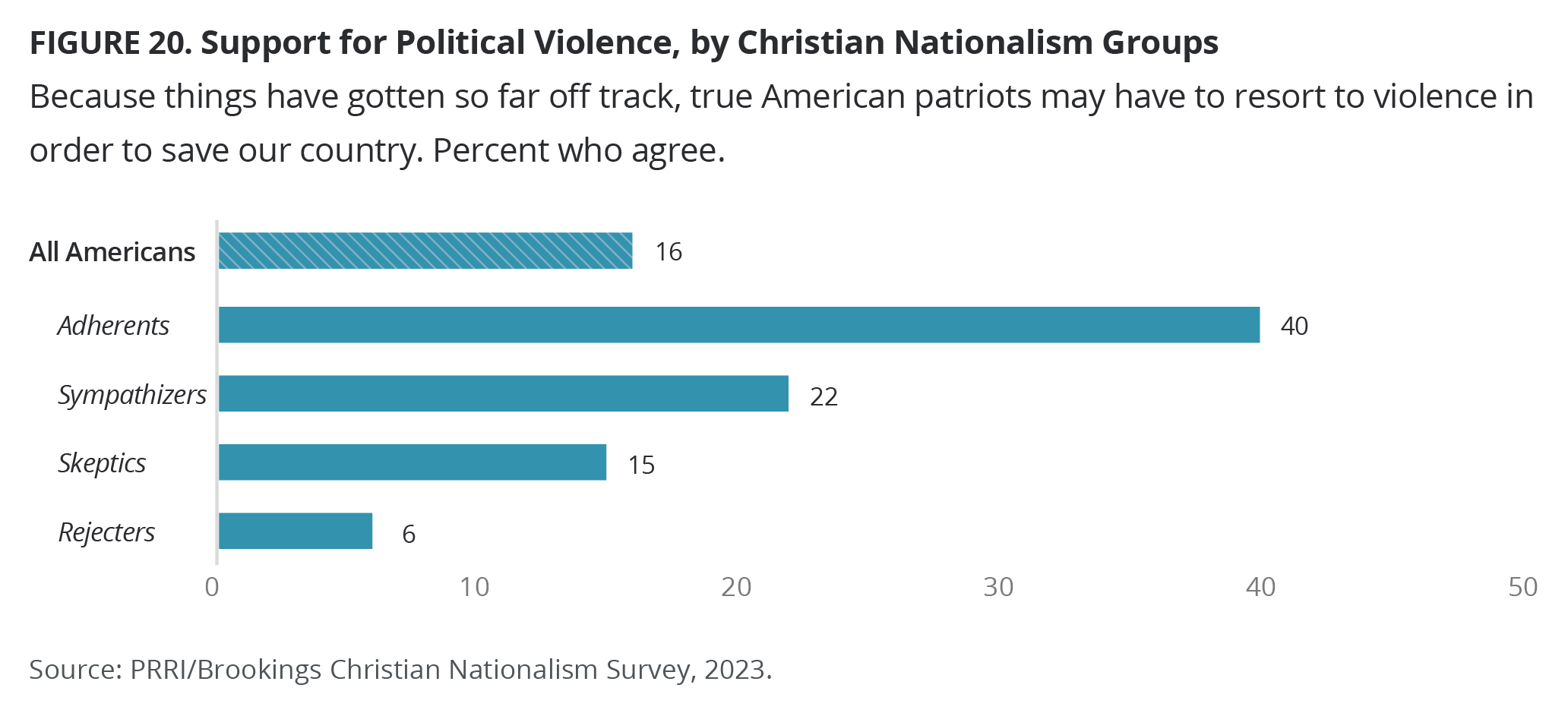
Americans who believe that true American patriots may have to resort to violence in order to save our country are more likely than those who disagree with this idea to report resorting to violence when settling personal disagreements. Among supporters of political violence, 12% said they have used or threatened to use a weapon on someone (6% said it was the right decision and 6% said it was the wrong decision), compared to only 1% of those who disagree with the statement about the need for political violence. Looked at in the other direction, among the 9% of Americans who say they have settled disagreements with some type of physical assault or weapon (whether or not it was the right decision), 41% agree that true American patriots may have to resort to violence in order to save our country.
Whiteness and Christian Nationalism
Historically, the ideology of Christian nationalism has been linked to a dominant white Anglo-Saxon Protestant cultural identity, a connection that is reflected in a number of attitudinal patterns related to religious pluralism, race, and immigration above. This conflation of European Christian identity with American identity is also evident in responses to two additional questions.
America as a New Promised Land for European Christians
In addition to the questions that make up the Christian nationalism scale, the survey included a stand-alone question that asked respondents to agree or disagree with the following statement: “God intended America to be a new promised land where European Christians could create a society that could be an example to the rest of the world.” By a margin of two to one, Americans overall reject this assertion (30% agree, 67% disagree).
However, even though none of the questions for the Christian nationalism scale contain any reference to race or European descent, responses to this statement about America as a new promised land for European Christians are highly correlated to the Christian nationalism scale. More than 8 in 10 Christian nationalism adherents (83%) agree with this statement, as do two-thirds of Christian nationalism sympathizers (67%). By contrast, only one in five Christian nationalism skeptics (19%) and 3% of rejecters agree that America was selected by God as a promised land for white Christians.
Among Christian nationalism sympathizers and adherents who are white, agreement increases to 70% and 87%, respectively. Among Christian nationalism sympathizers and adherents who are not white, agreement is 63% and 77%, respectively.
A Survey Experiment: Measuring a Willingness to Fight for a White Christian Nation
The survey contained a list experiment to estimate respondents’ willingness to fight for a specifically white Christian nation.
List experiments are survey tools designed to help measure attitudes on sensitive topics for which we would expect at least some respondents to be reticent to reveal their true opinions. List experiments create an indirect estimate of attitudes by giving half of the survey sample three control statements, while the other half receives those same three control statements plus the experimental statement. Respondents in both groups are asked to report how many statements they agree with — not which ones. The differences in response patterns are then analyzed to estimate the proportion of respondents who agree with the experimental statement.
The three control statements received by both groups are:
- The United States is a melting-pot country of different backgrounds, races, and ethnicities, and I am proud to be part of it.
- The United States is the best place to live in the world, and I could not imagine living anywhere else.
- The United States is the most powerful country in the world, and I feel safer living here than anywhere else.
The experimental statement received only by the treatment group is:
- The United States is a white Christian nation, and I am willing to fight to keep it that way.
By measuring the difference in estimated means (the number of statements with which respondents agreed on average) between the treatment and control groups, we can estimate the proportion of respondents who are likely to agree with the experimental statement about white Christian nationalism. If no one agreed with the experimental statement, the means would not differ between the two groups.
In the control group, which was given only the three non-experimental statements, respondents agreed with 2.03 statements on average. In the treatment group, which received all four statements, that average increased to 2.20 statements. The 0.17 difference between the mean scores of the two groups indicates that an estimated 17% of respondents agree with the experimental statement that “the United States is a white Christian nation, and I am willing to fight to keep it that way.”
These results give us confidence in the accuracy of the Christian nationalism scale we have developed here, where we show 10% of Americans qualifying as Christian nationalism adherents and an additional 19% qualifying as Christian nationalism sympathizers. If anything, the list experiment — which shows that nearly one in five Americans assert not only that the United States is a white Christian nation but also that they are willing to fight to preserve it — would suggest that the 10% estimate of Christian nationalism adherents may be conservative.
Christian Nationalism and QAnon Beliefs
Christian nationalism beliefs are strongly correlated with support for QAnon, an extremist movement on the political right. To measure the scope of the QAnon movement, PRRI tracks agreement with three statements that form the core tenets of the conspiracy theory the movement is based in:
- The government, media, and financial worlds in the U.S. are controlled by a group of Satan-worshipping pedophiles who run a global child sex-trafficking operation.
- There is a storm coming soon that will sweep away the elites in power and restore the rightful leaders.
- Because things have gotten so far off track, true American patriots may have to resort to violence in order to save our country.
Agreement with these three statements has remained relatively steady from 2021 to 2022. Roughly one in five Americans mostly or completely believe that there is a storm coming to restore rightful leaders (24%), that the government, media, and financial worlds are controlled by Satan-worshipping pedophiles (19%), or that violence may be necessary to save the country (16%).
Americans who mostly agree with these three statements are considered QAnon believers, those who mostly disagree are considered QAnon doubters, and those who completely disagree are considered QAnon rejecters. Currently, QAnon rejecters make up 34% of Americans, doubters make up 50%, and believers make up 17% of Americans.
Nearly six in ten QAnon believers are also either Christian nationalism sympathizers (29%) or adherents (29%), compared to 31% who are Christian nationalism skeptics and 10% who are rejecters. The relationship between QAnon beliefs and Christian nationalism is even stronger among white Americans. Among white QAnon believers, 31% are Christian nationalism sympathizers and 34% are adherents. On the flipside, nine in ten QAnon rejecters are either Christian nationalism skeptics (37%) or rejecters (53%).
Appendix A. Christian Nationalism Scale Methodology
To measure Christian nationalism, the PRRI/Brookings Christian Nationalism Survey included a battery of five questions about the relationship between Christianity, American identity, and the U.S. government. Respondents were asked whether they completely agree, mostly agree, mostly disagree, or completely disagree with each of the following statements: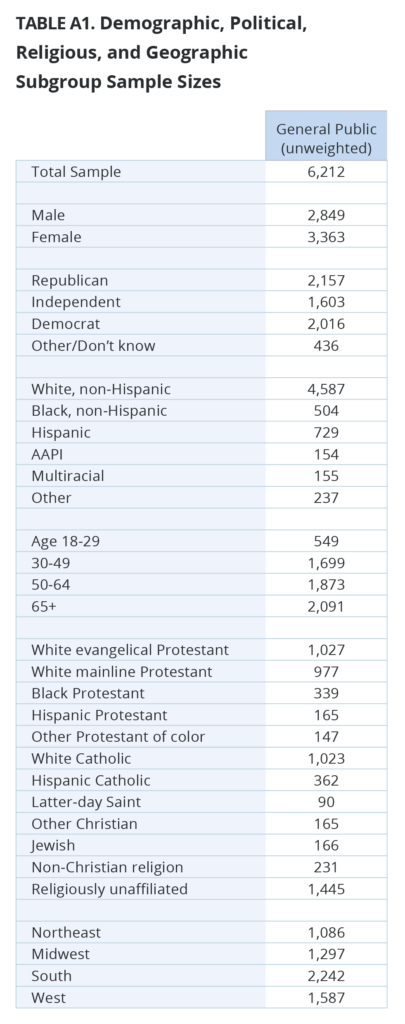
- The U.S. government should declare America a Christian nation.
- U.S. laws should be based on Christian values.
- If the U.S. moves away from our Christian foundations, we will not have a country anymore.
- Being Christian is an important part of being truly American.
- God has called Christians to exercise dominion over all areas of American society.
Complete agreement with a statement is assigned a score of 1, while complete disagreement is assigned a score of 0. Americans who mostly agree or mostly disagree are assigned scores 0.67 and 0.33, respectively. Agreement with these statements is highly internally consistent, with a Cronbach’s alpha score of 0.92. Averaging these scores across the five statements creates an individual’s scale score, with an average score among all Americans of 0.32. Respondents who did not provide a response for at least three of the five statements were not assigned a scale score.
Respondents are then grouped accordingly:
Score 0.75-1: Christian Nationalism Adherents
Score 0.5-0.74: Christian Nationalism Sympathizers
Score 0.01-0.49: Christian Nationalism Skeptics
Score 0: Christian Nationalism Rejecters
Survey Methodology
The survey was designed and conducted by PRRI. The survey was made possible through the generous support of the Foundation to Promote Open Society, with additional support from the Carnegie Corporation of New York, the Wilbur & Hilda Glenn Family Foundation, and the Unitarian Universalist Veatch Program at Shelter Rock. The survey was conducted among a representative sample of 5,416 adults (age 18 and up) living in all 50 states in the United States, who are part of Ipsos’s Knowledge Panel and an additional 268 who were recruited by Ipsos using opt-in survey panels to increase the sample sizes in smaller states. Additionally, this survey includes 528 additional respondents recruited by Ipsos using opt-in survey panels to increase the number of Republicans in the data. Interviews were conducted online between November 21 and December 14, 2022.
Respondents are recruited to the KnowledgePanel using an addressed-based sampling methodology from the Delivery Sequence File of the USPS – a database with full coverage of all delivery addresses in the U.S. As such, it covers all households regardless of their phone status, providing a representative online sample. Unlike opt-in panels, households are not permitted to “self-select” into the panel; and are generally limited to how many surveys they can take within a given time period.
The initial sample drawn from the KnowledgePanel was adjusted using pre-stratification weights so that it approximates the adult U.S. population defined by the latest March supplement of the Current Population Survey. Next, a probability proportional to size (PPS) sampling scheme was used to select a representative sample.
To reduce the effects of any non-response bias, a post-stratification adjustment was applied based on demographic distributions from the most recent American Community Survey (ACS). The post-stratification weight rebalanced the sample based on the following benchmarks: age, race and ethnicity, gender, Census division, metro area, education, and income. The sample weighting was accomplished using an iterative proportional fitting (IFP) process that simultaneously balances the distributions of all variables. Weights were trimmed to prevent individual interviews from having too much influence on the final results. In addition to an overall national weight, separate weights were computed for each state to ensure that the demographic characteristics of the sample closely approximate the demographic characteristics of the target populations. The state-level post-stratification weights rebalanced the sample based on the following benchmarks: age, race and ethnicity, gender, education, and income.
The margin of error for the national survey is +/- 1.6 percentage points at the 95% level of confidence, including the design effect for the survey of 1.7. In addition to sampling error, surveys may also be subject to error or bias due to question wording, context, and order effects. Additional details about the KnowledgePanel can be found on the Ipsos website: https://www.ipsos.com/ en-us/solution/knowledgepanel
Endnotes
[1] The group of “other non-Christian religious Americans” includes Americans who identify as Muslim, Buddhist, Hindu, Unitarian Universalist, or any other non-Christian, non-Jewish affiliation. Sample sizes are too small to analyze these groups individually.
[2] Mainstream news outlets include local broadcast news, national broadcast networks (NBC, CBS, and ABC), CNN, MSNBC, and PBS.
[3] The sample size of adherents of color is too small to divide into additional race and ethnicity categories.
